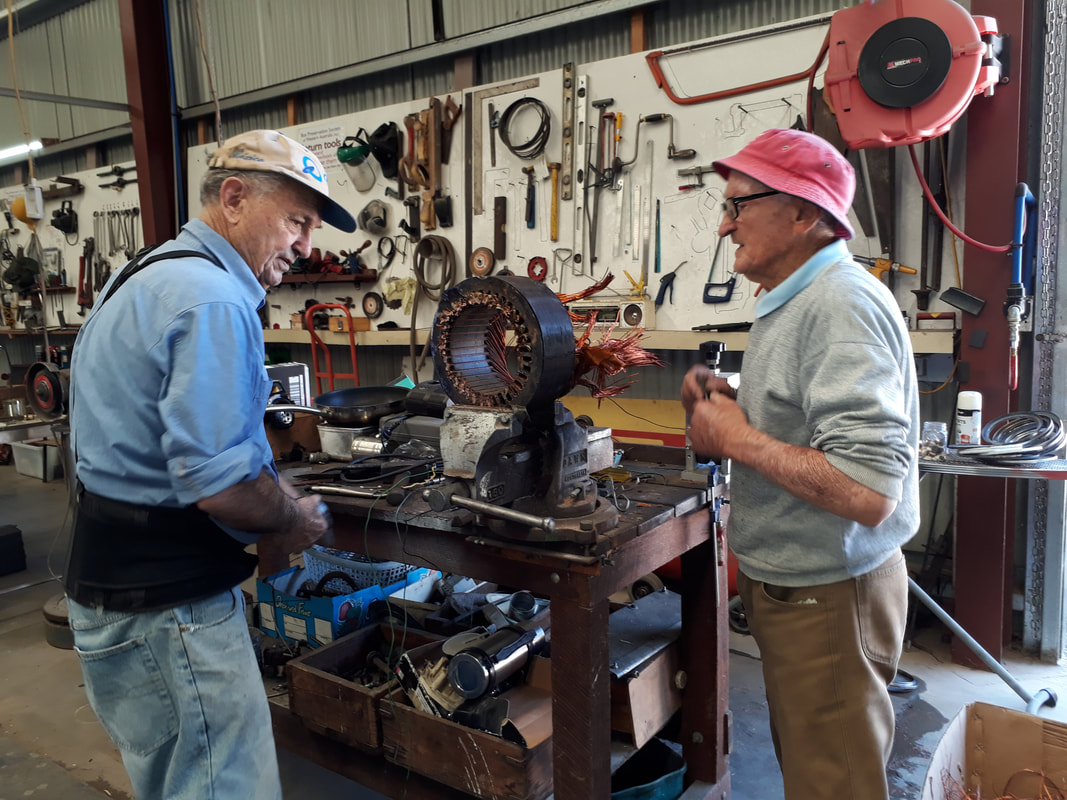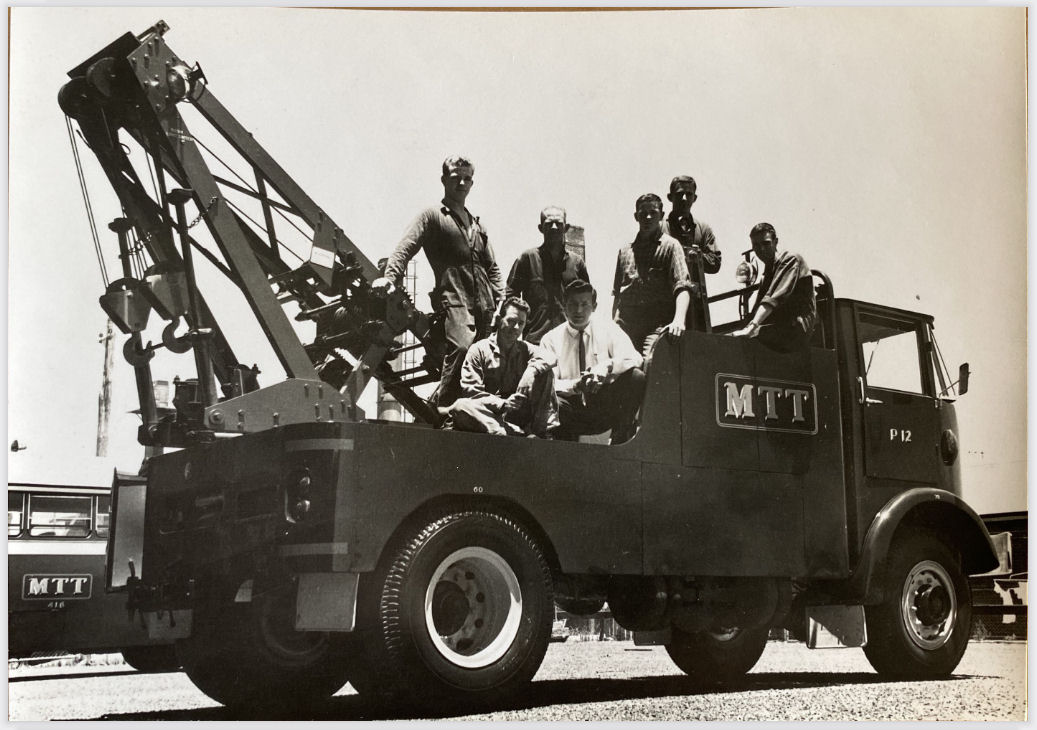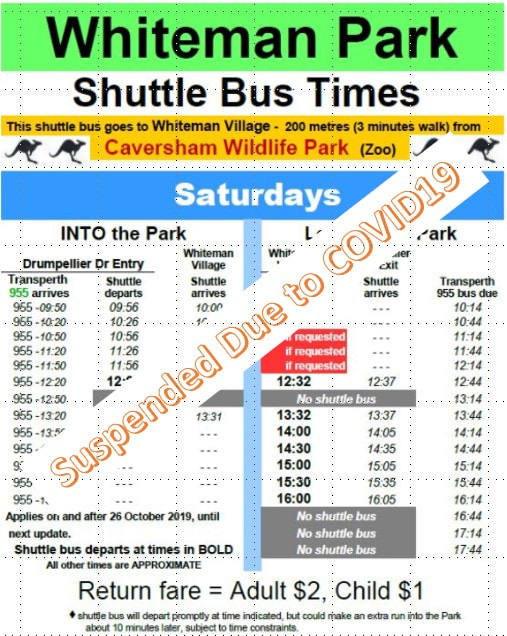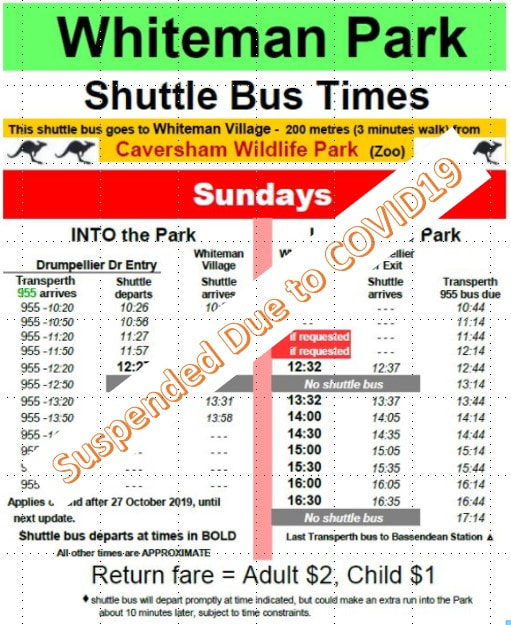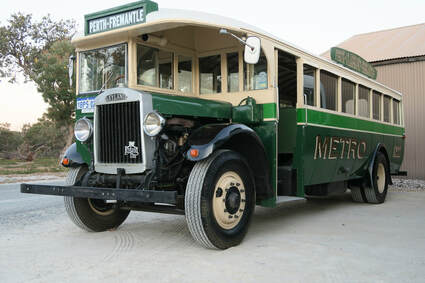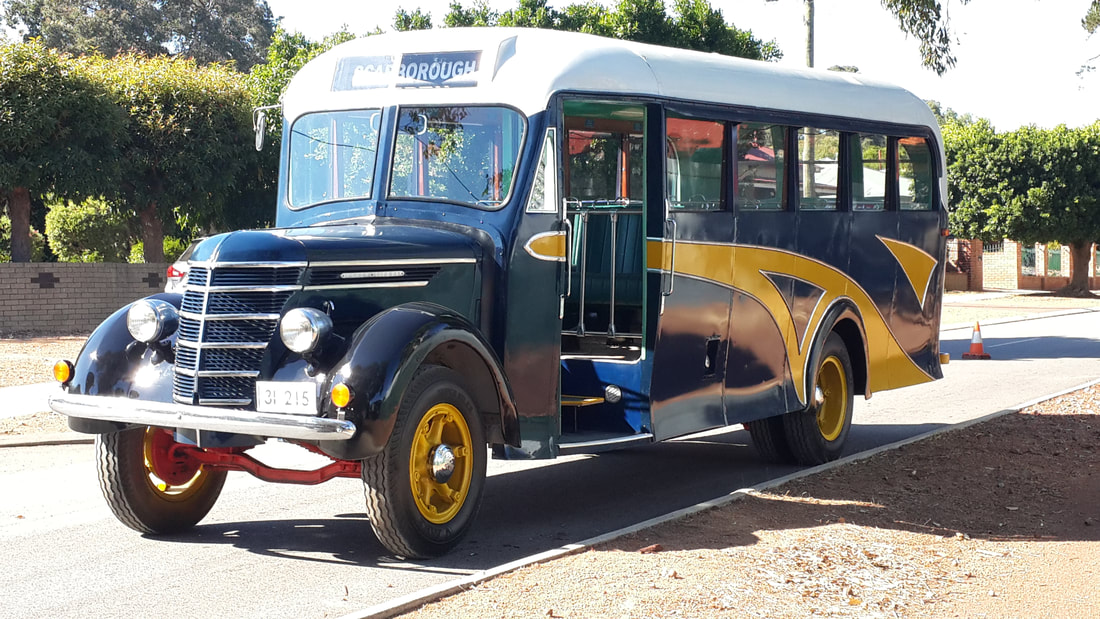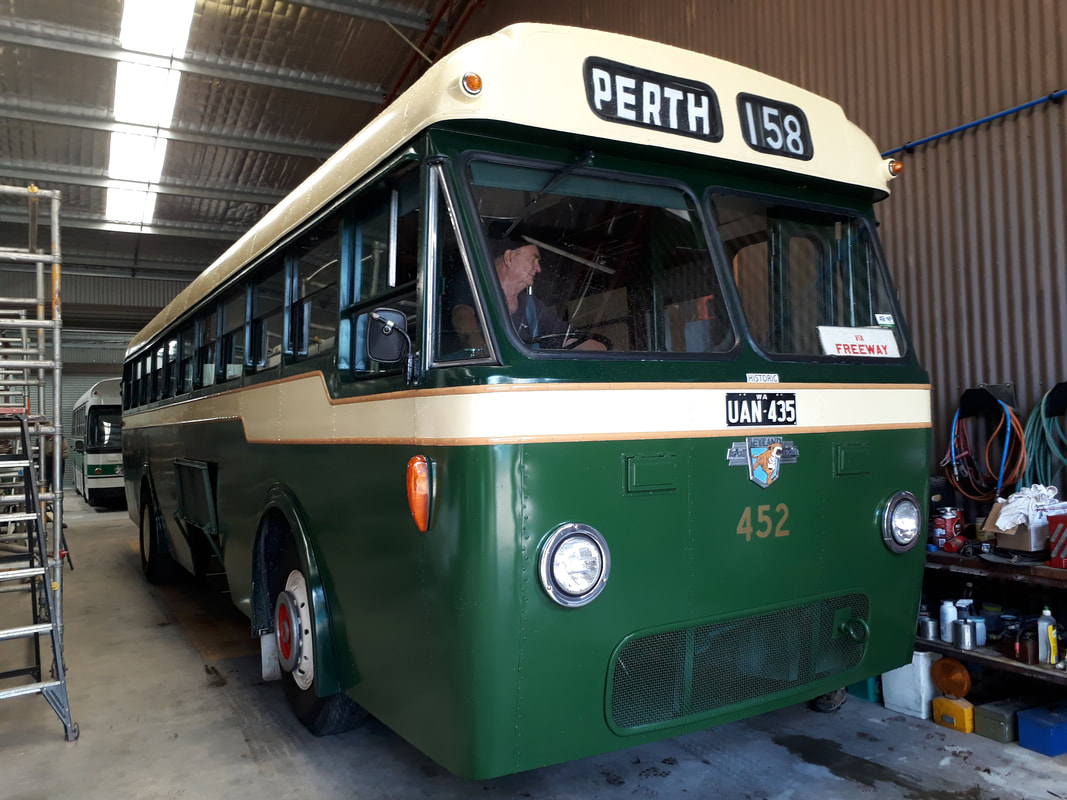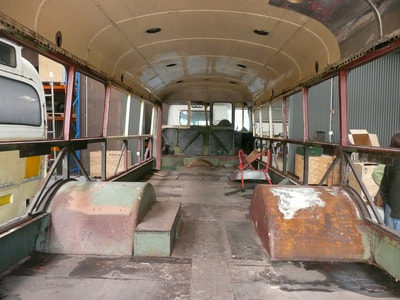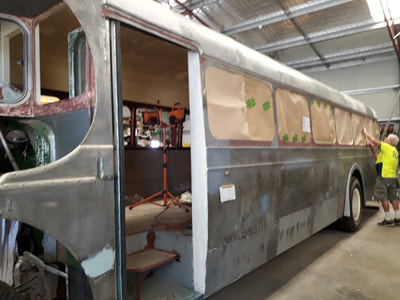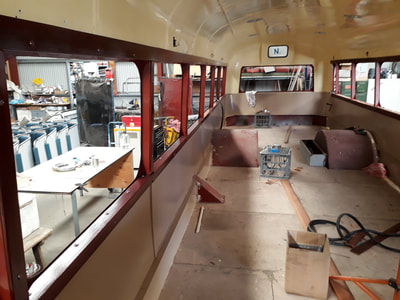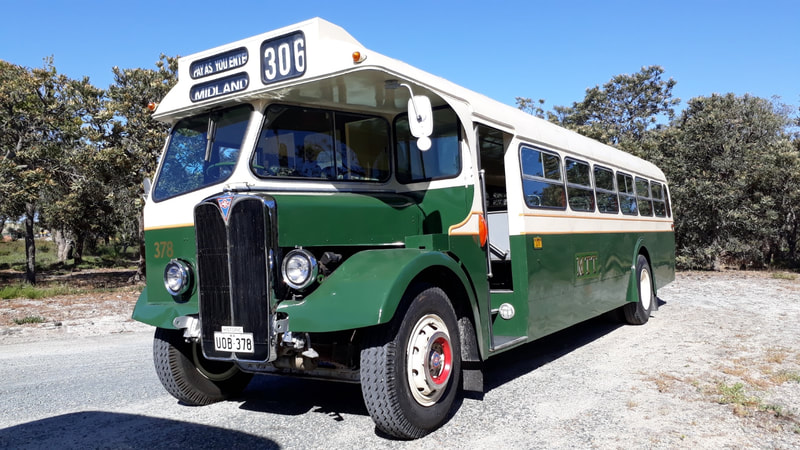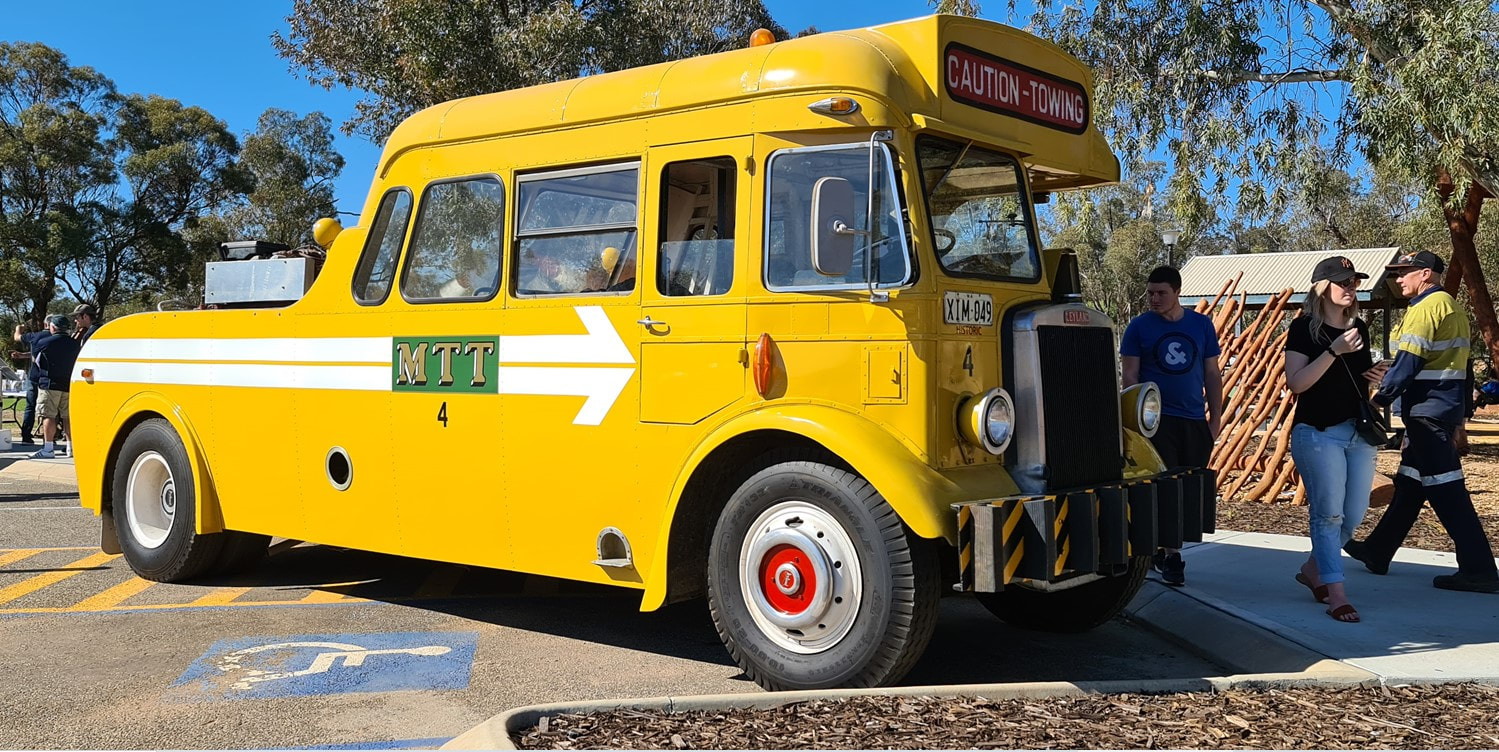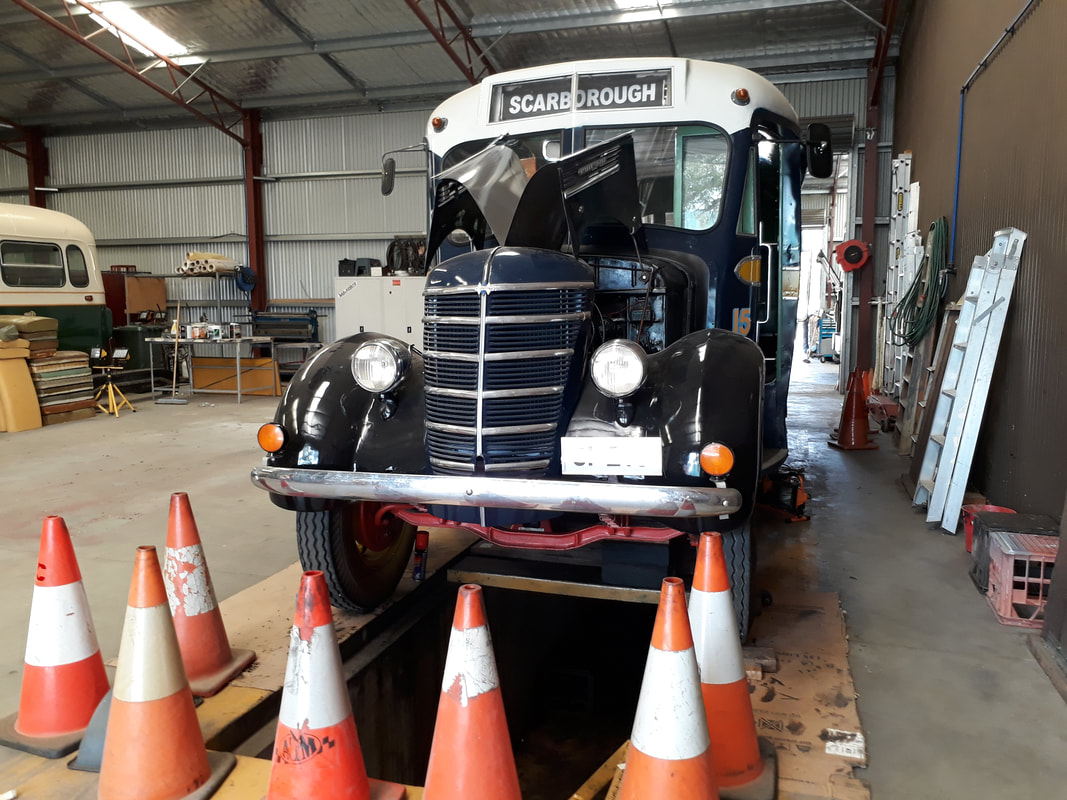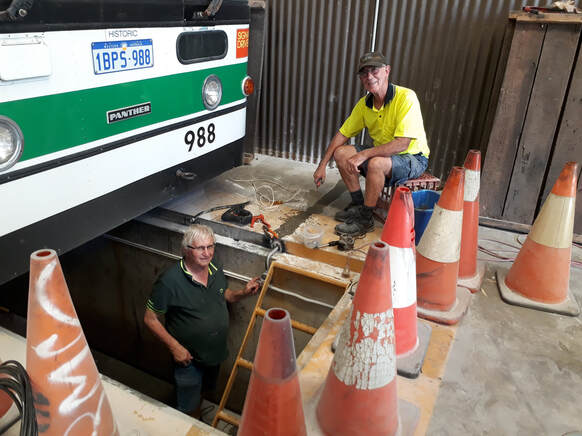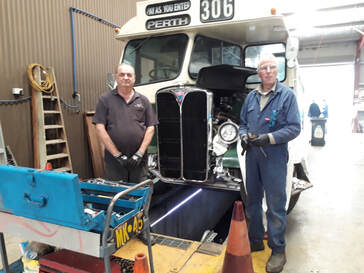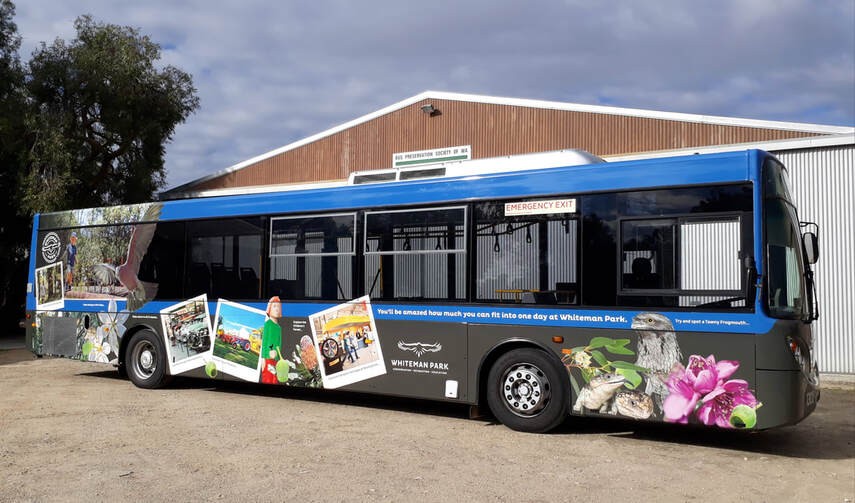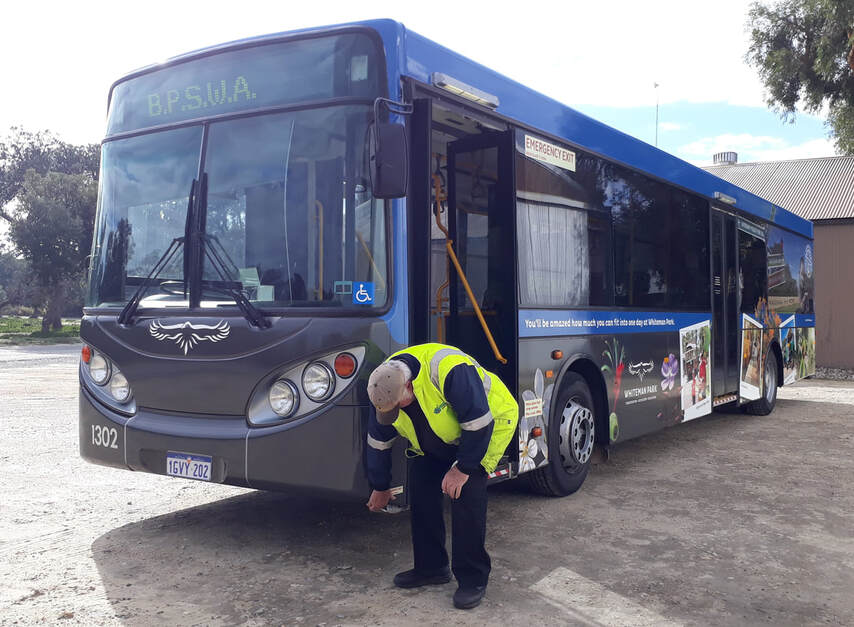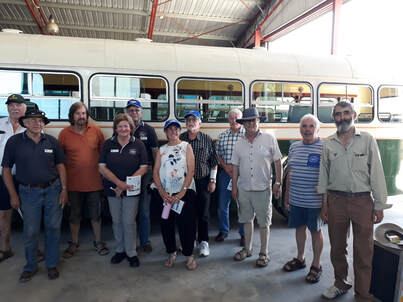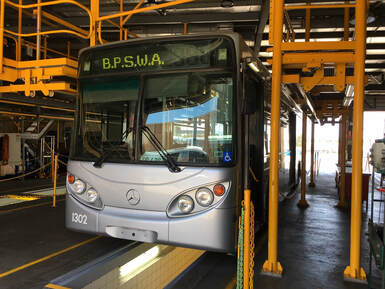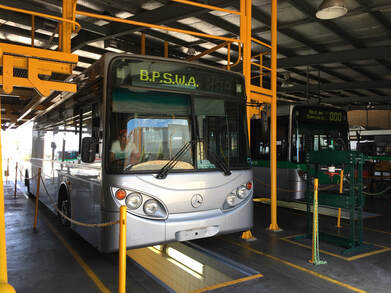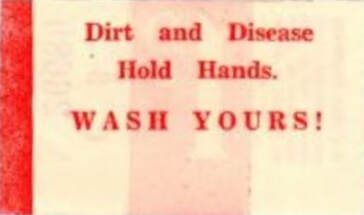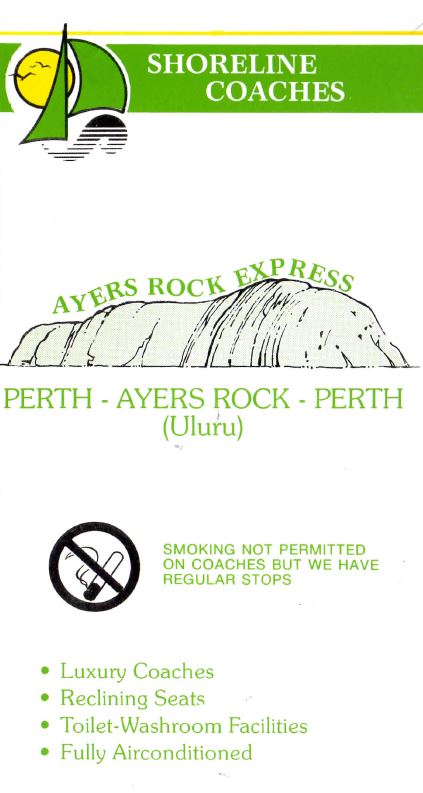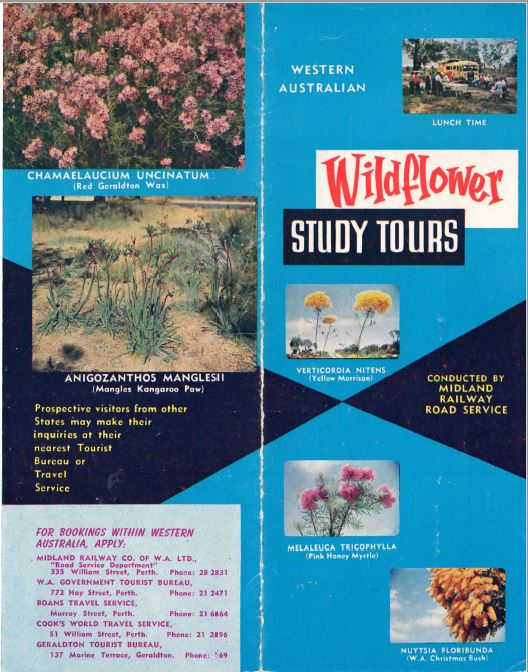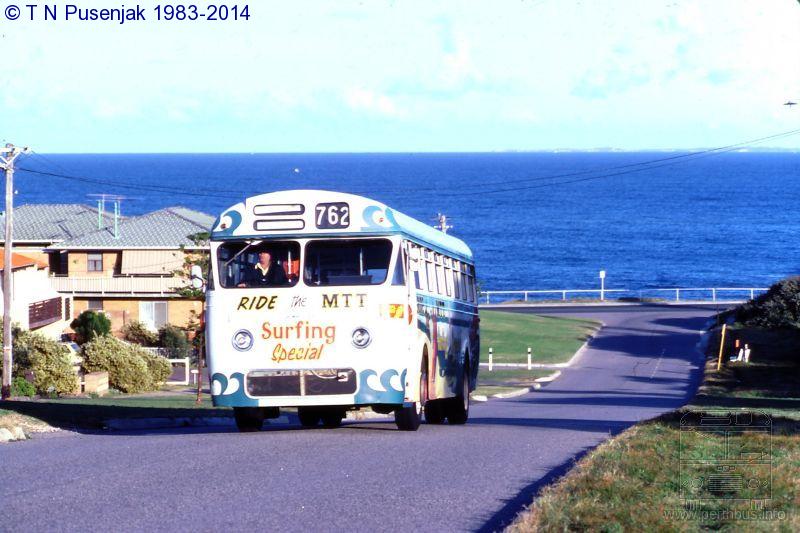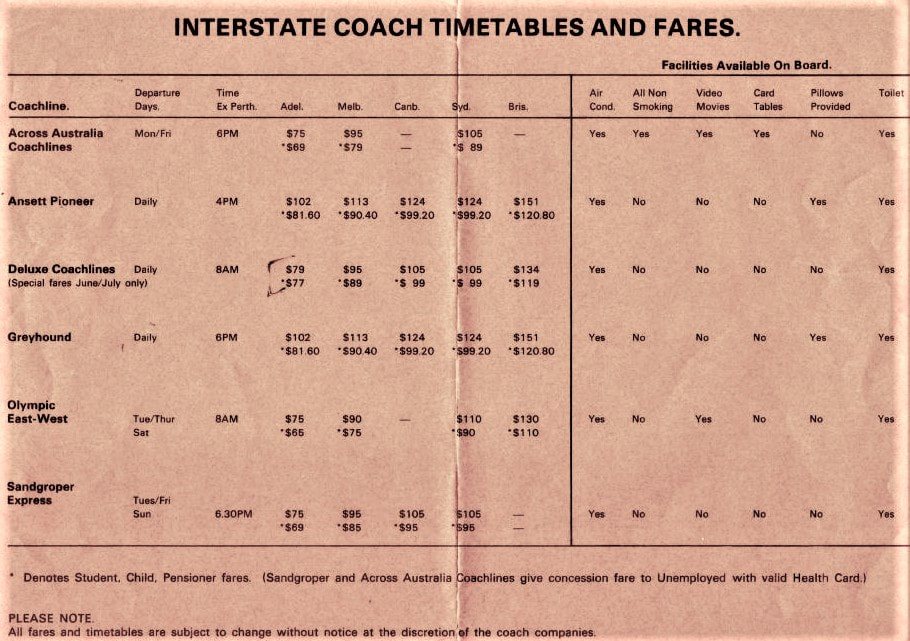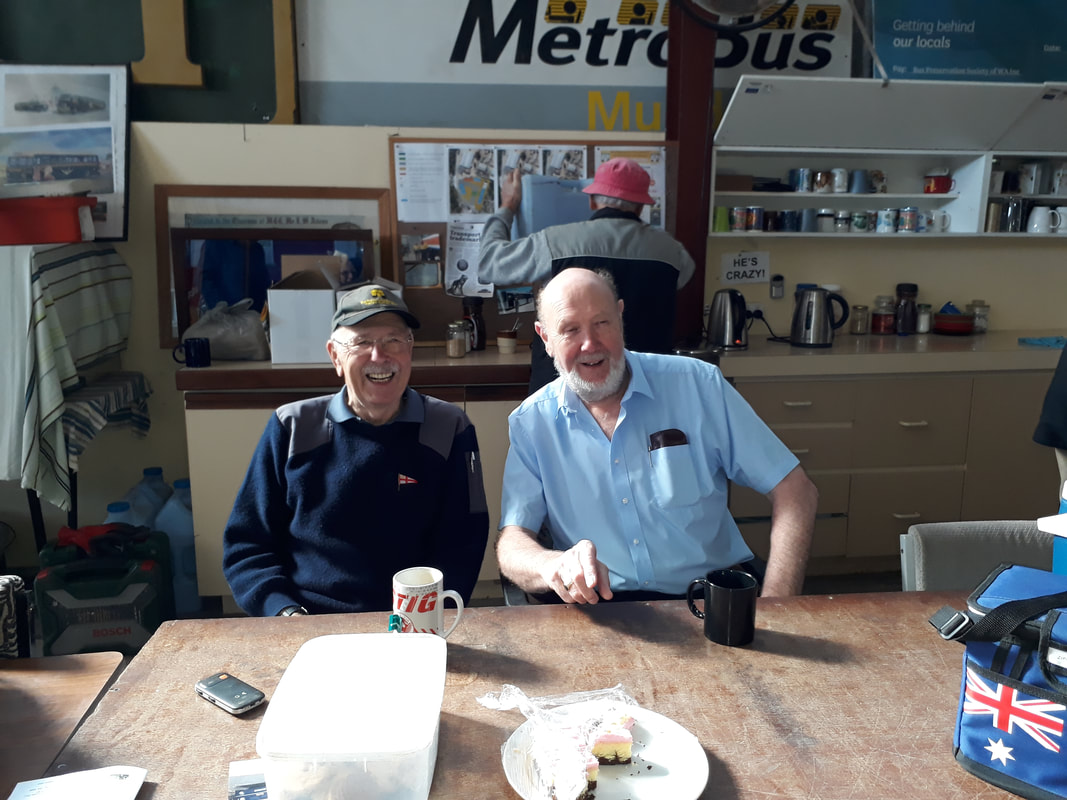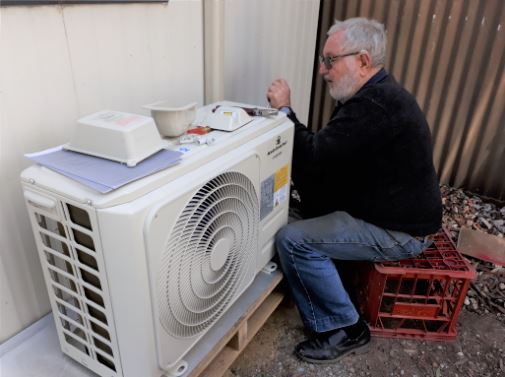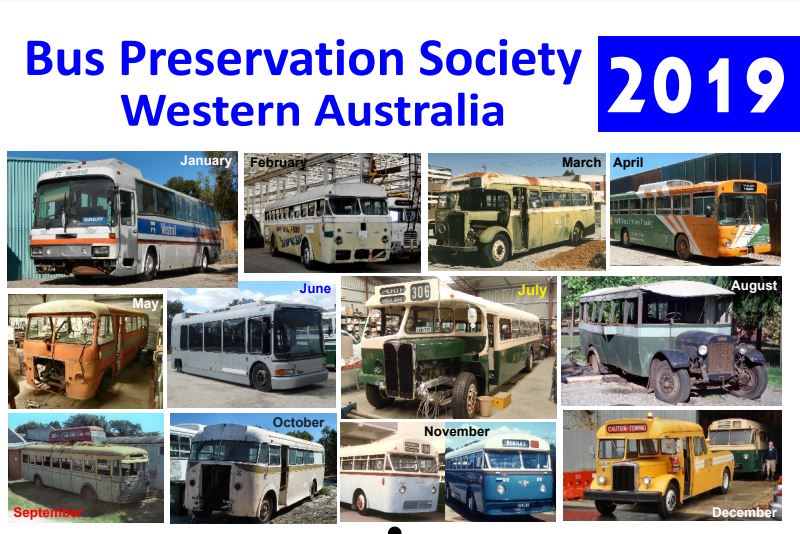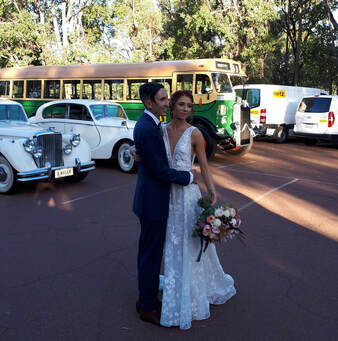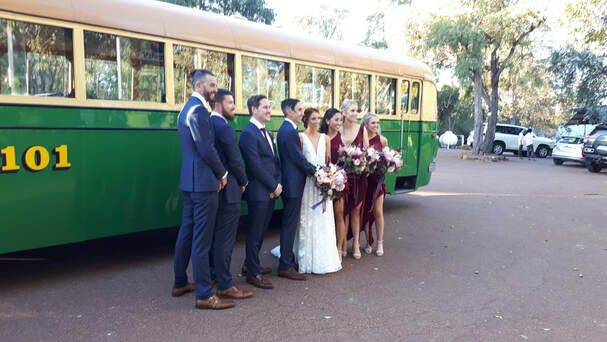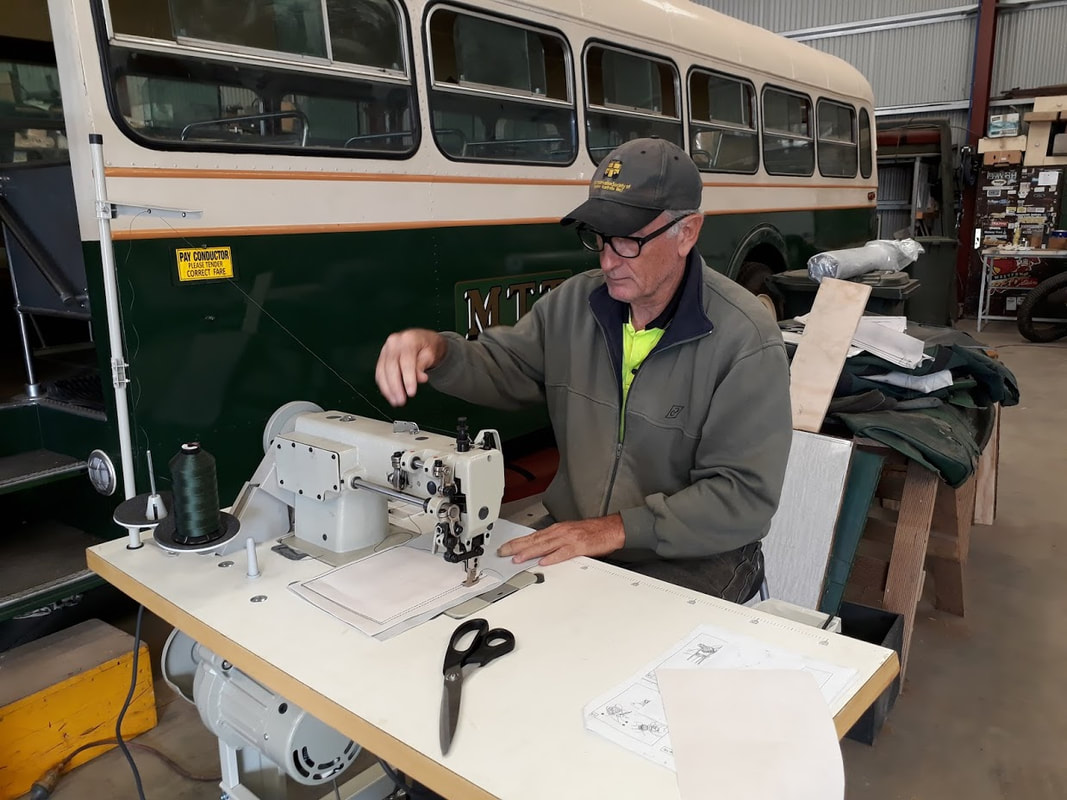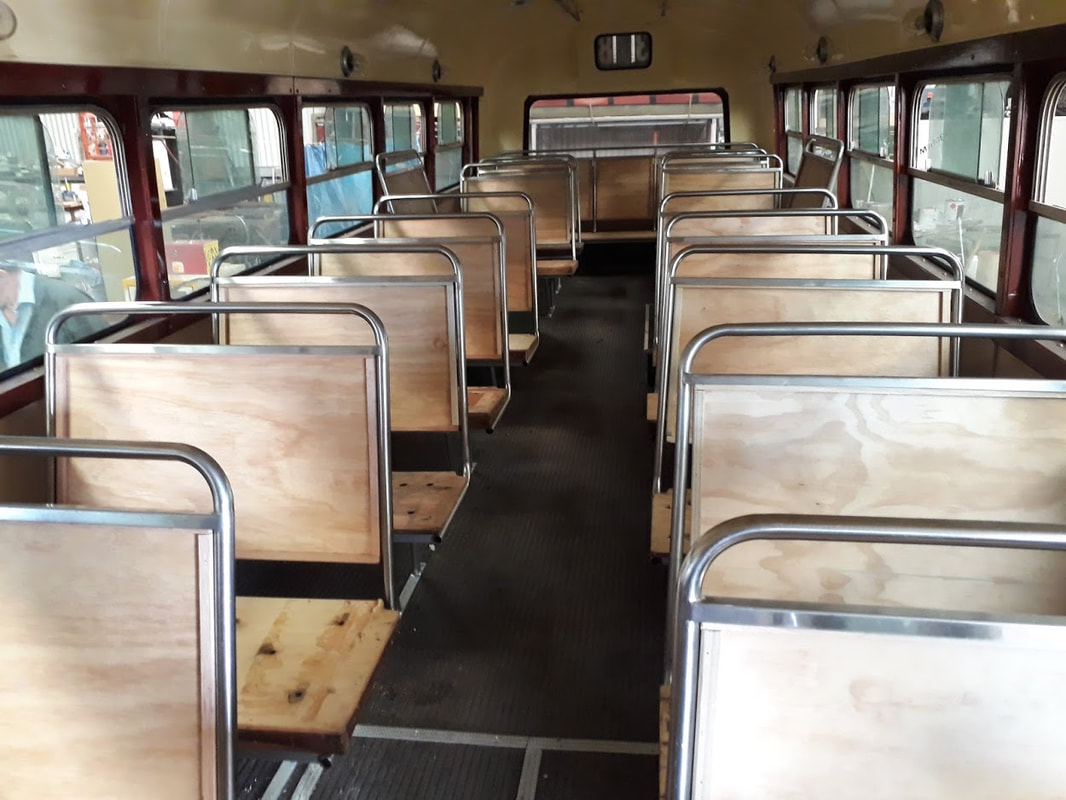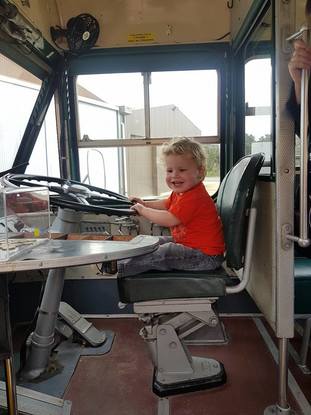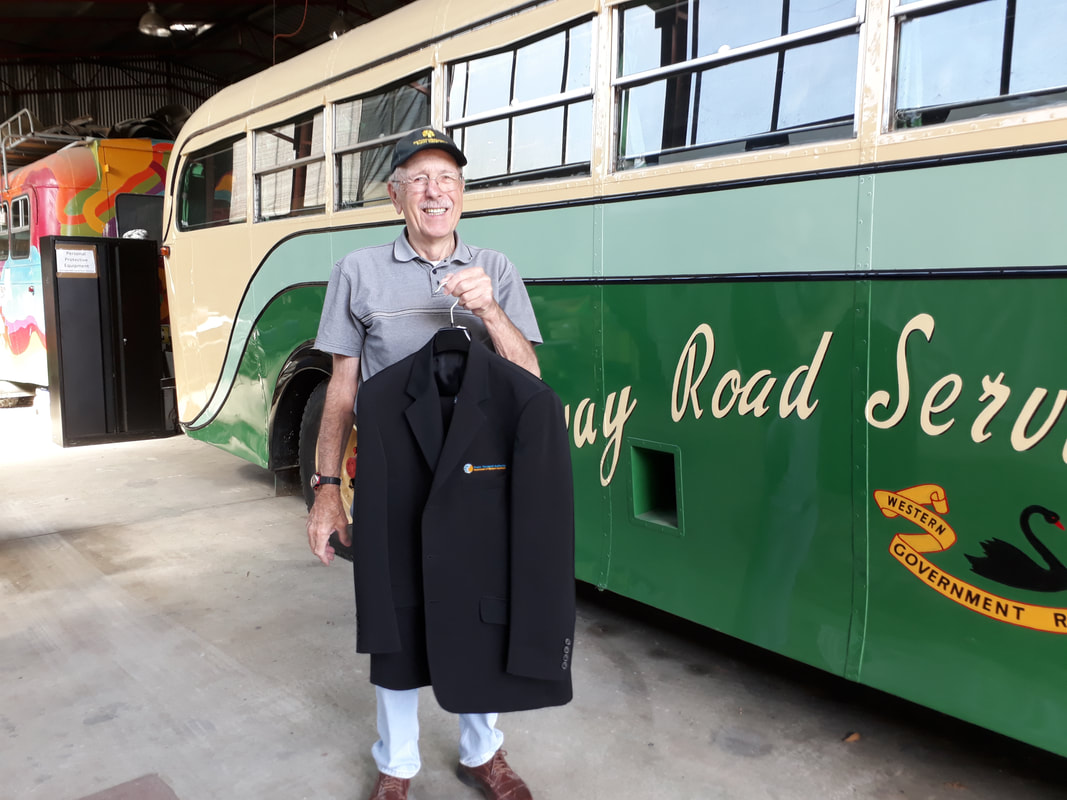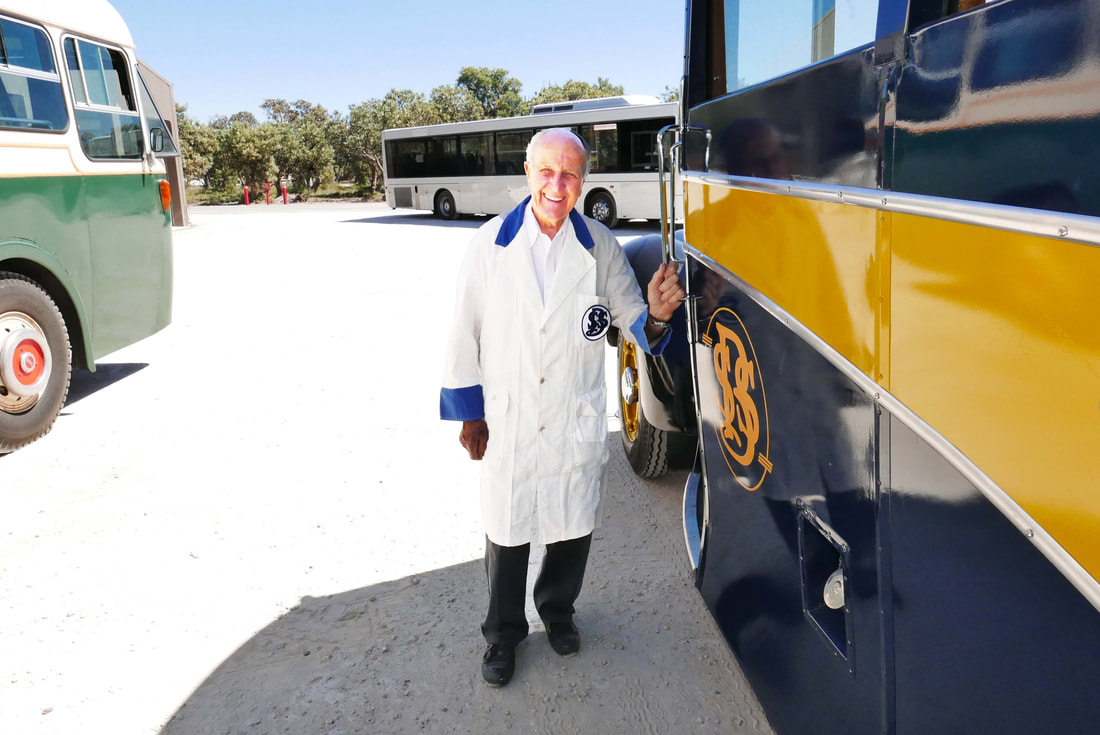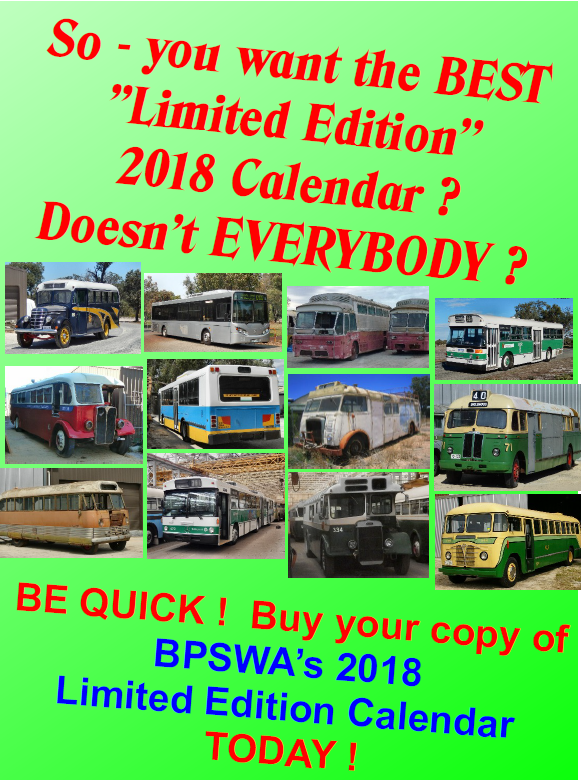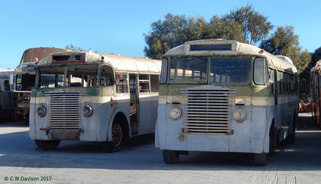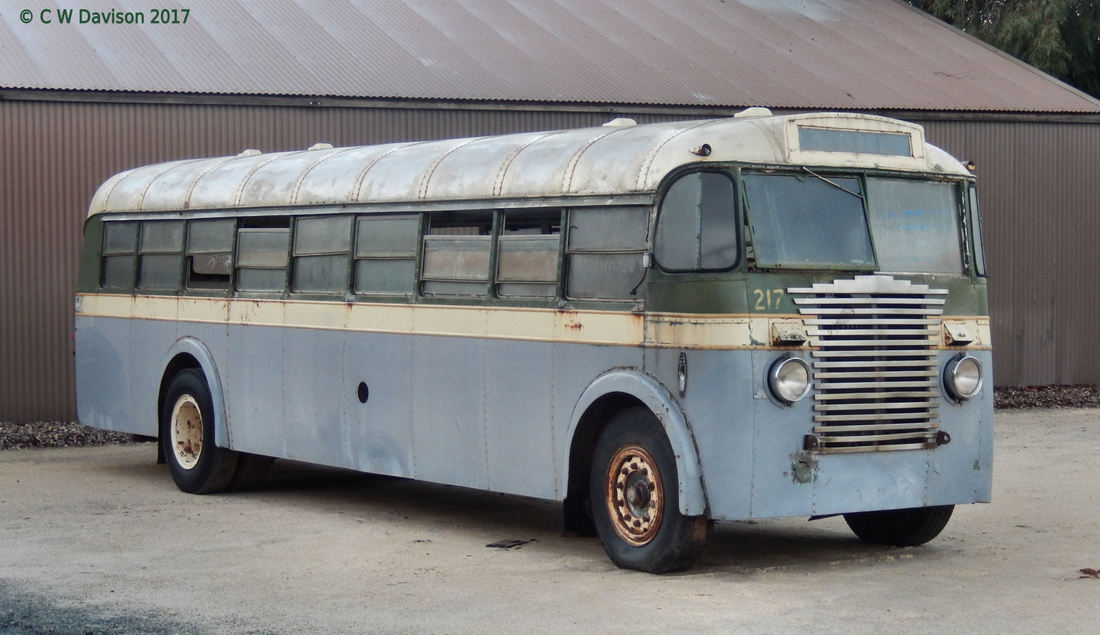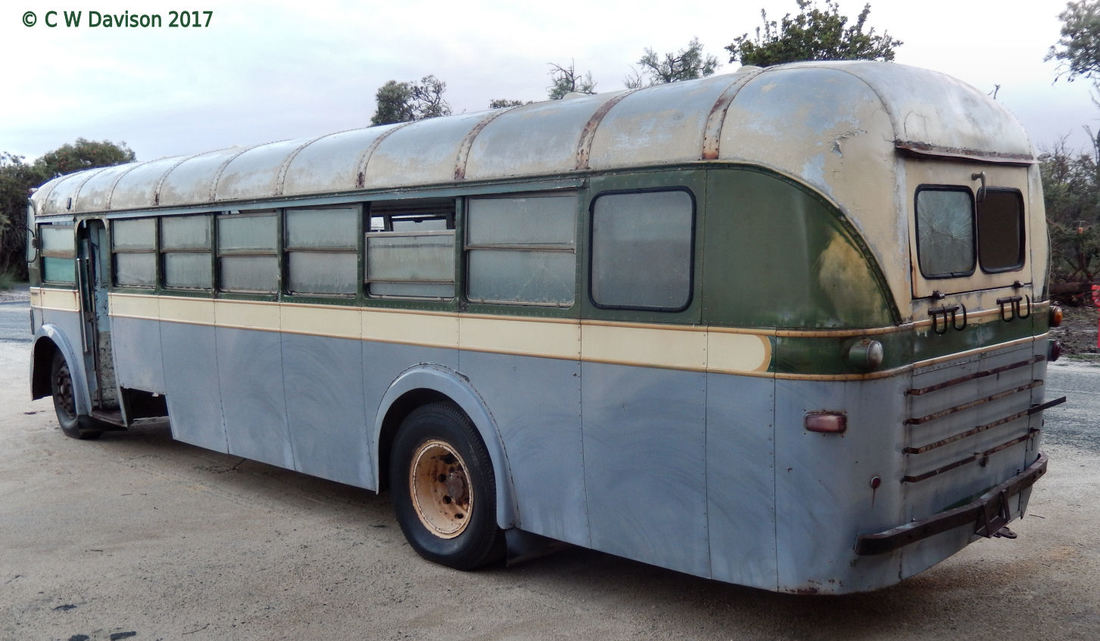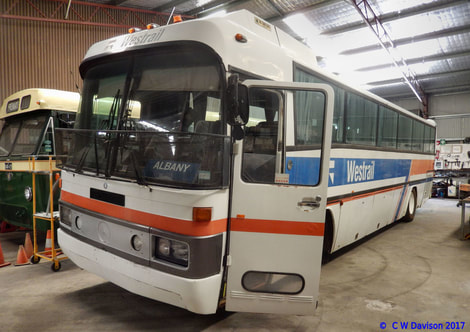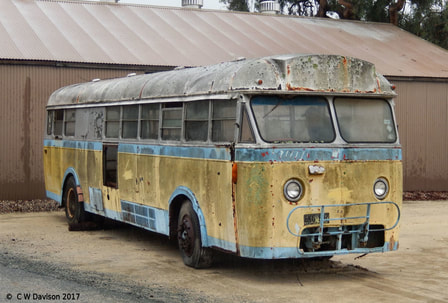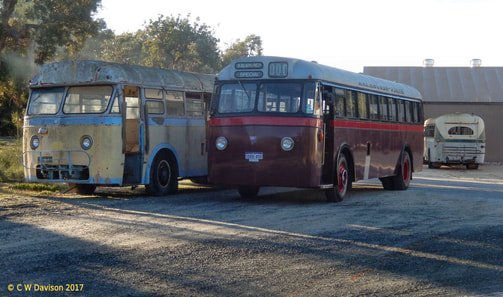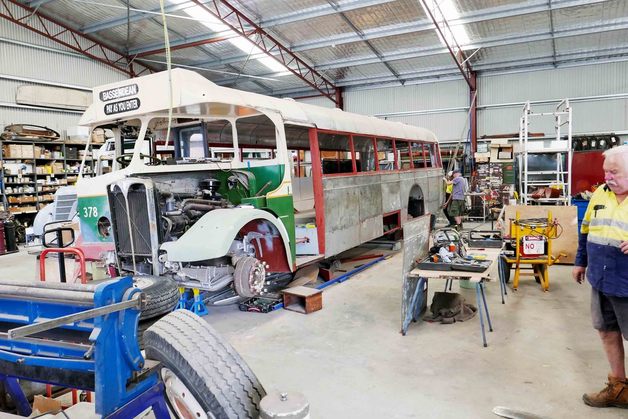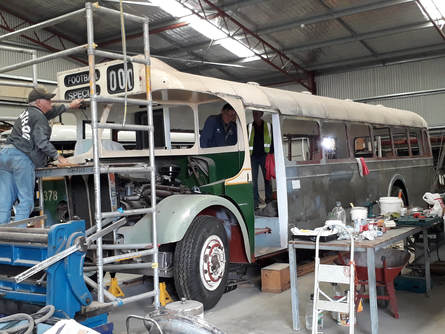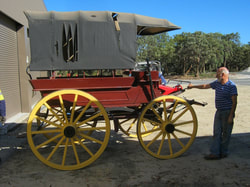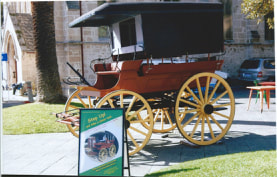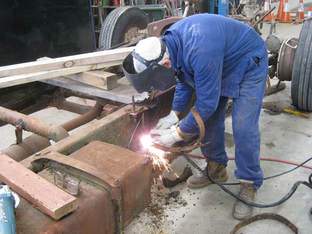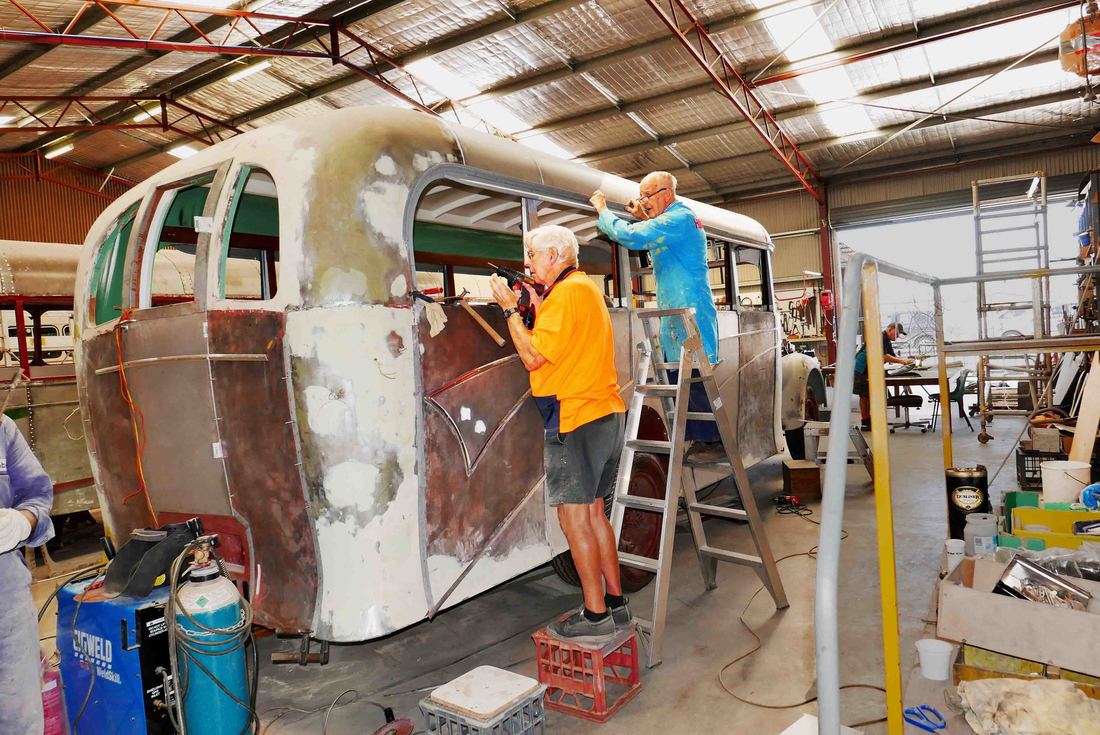Check out the recently featured article with...
The BPSWA 2023 Calendar is Now Available!
|
Our 2023 calendar is now available for purchase until stock lasts. The theme for this calendar is the early bus companies which provided services to Perth prior to the establishment of the Metropolitan Perth (Passesnger) Transport Trust (MTT) in 1958. It is planned that the colourful early bus company logos will eventually be displayed on the sides of our Events Bus which is currently being repainted. Calendars can be purchased with either cash or EFT at our workshop. Or, you can click on the button below to order. |
|
Tow Wagon 4 Pays a Surprise Visit
|
Early in February, a band of BPSWA Members and our 1950 Leyland Tiger OPS4-1 paid a surprise visit to a former colleague and friend Vik Marko.
BPSWA Honorary Life Member, John Young, first met Vik at Technical College in 1962 when Vik was an Apprentice Mechanic with the MTT, and John was with the Railway Road Service. An apprenticeship at that time was 5 years, and the two continued their friendship and working relationship over many decades during their careers at MTT, Transperth, and again later at Swan Transit. After a short time with the Police Department, Vik had returned to the MTT at Morley Depot and later joined the Schedules Department where his skill as a Scheduler became renowned throughout the industry. Vik's wife Julie also enjoyed the moment with Vik. Vik was truly surprised and enjoyed the visit immensely with his former colleagues, impressing everyone with his astonishing recall of names and events from the past. Photos: Courtesy of Graham Horton, Ron Franklin and Dave Tierney, and early MTT photo from Brad Miocevich. |
|
Leyland Lion Refurbishment
The extensive refurbishment work on our ex WAGR Dp90 Leyland Lion PSR1/1 continues in the workshop. Peter Hancey worked on the rear bumpers whilst Kevin Nicholls worked on corrosion repairs to the cargo compartment doors.
Back in Business
|
June 2020
Following the lifting of Covid-19 restrictions many of our enthusiastic members have returned to the workshop and are eager to get started on restorations and other projects. First off the rank, was a review of our 1946 Bedford OB "Miss Pemberton" to determine the next steps in the restoration plan. Our Leyland Lion PSR1/1 (DP90) is in the workshop for a body and paint work refresh, so Kevin was hard at work on the panels. Trevor is manufacturing a new tow hitch for our trusty Leyland OPS4/1 tow wagon, and Reg was busy working with scrap metal to earn much needed income. |
|
CORONAVIRUS UPDATE
Whiteman Park Shuttle Bus Service: - Temporarily suspended until further notice
Historic Bus Hop-on-Hop-Off Service: Service re-commenced 6th September 2020
Whiteman Park Explorer Guided Tours: Check the Whiteman Park Website for details regarding availability.
Whiteman Park Shuttle Bus Timetable
(runs every weekend except Christmas Day)
In association with Whiteman Park, the Bus Preservation Society of WA provides a Shuttle Service for visitors from the Lord Street entrance of Whiteman Park into the village and return and is designed to connect with the 955 bus passing the Lord Street Gate entrance/exit. The service is provided by volunteer drivers from the Bus Preservation Society of WA and operates on Saturdays and Sundays throughout the year. Timetables for the Shuttle Service are available below, including a PDF copy for download.
The Whiteman Park Administration has set a fee of $2 for this service. Children under 5 years of age travel free. This entitles the ticket holder to travel on our buses while in the park, upon presentation of the ticket. Tickets are issued to passengers when boarding the bus at the commencement of their first journey for the day.
The Park also operates the free 'Explorer' Guided Bus Tours within the Park on Monday's. Check the Whiteman Park Website for details or make enquiries with the Information Office Located in the Village, adjacent to Car Park 7 on phone (08) 9209 6000.
The Whiteman Park Administration has set a fee of $2 for this service. Children under 5 years of age travel free. This entitles the ticket holder to travel on our buses while in the park, upon presentation of the ticket. Tickets are issued to passengers when boarding the bus at the commencement of their first journey for the day.
The Park also operates the free 'Explorer' Guided Bus Tours within the Park on Monday's. Check the Whiteman Park Website for details or make enquiries with the Information Office Located in the Village, adjacent to Car Park 7 on phone (08) 9209 6000.
Please Note:
School term and school holiday dates for WA are on the __Department of Education website.
- When New Year’s Day, Anzac Day, or Christmas Day falls on a Saturday or Sunday the next following Monday is also a public holiday.
- When Boxing Day falls on a Saturday the next following Monday is also a public holiday, and when Boxing Day falls on a Sunday or Monday the next following Tuesday is also a public holiday.
School term and school holiday dates for WA are on the __Department of Education website.
CAUTION: PLEASE NOTE
The shuttle timetables may change at very short notice due to COVID19 restrictions, ongoing Drumpellier Drive/Lord Street road construction project and changes to the Transperth bus 955 timetable.
The shuttle timetables may change at very short notice due to COVID19 restrictions, ongoing Drumpellier Drive/Lord Street road construction project and changes to the Transperth bus 955 timetable.
The Hino Powers Up
|
Some of our heritage buses are not simply static displays - they are used to provide essential shuttle services in and around Whiteman Park. A good example is our 1974 Hino (ex MTT #83) which is a popular bus in the park due to its eye-catching City Clipper yellow livery. For some time, the engine was losing power and required major work. Glenn Boorn and the team stripped the engine down and replaced piston rings and bearings and fitted reconditioned cylinder heads. The compressor and radiator were also reconditioned and Glenn can now finally shut the engine cover on a job well done.
|
|
Getting Ready for Heritage Displays
Our beautifully restored 1929 Leyland Lion (Metro 22) has been taken over to the Revolutions Museum in Whiteman Park to become our latest Heritage display. This replaces the equally beautiful 1938 International D35B (SBS15) which has had pride of place as our display for some time. See these and more of our heritage buses and restoration projects at Whiteman Park - click here to find out what's on at Whiteman Park.
Service Inspection
|
After a very successful day providing free bus services around York at the Motor Show, John Young put our 1962 Leyland Royal Tiger Worldmaster (MTT 452) over the pits for a thorough inspection to check for any oil or water leaks. The Worldmaster performed beautifully on the day in York but it pays to be cautious and provide the 56 year-old bus with the care and respect that it deserves.
|
Making Tyres Last The Distance
|
One way of getting the most out of tyres is to re-groove them and the latest addition to our workshop equipment is a tyre re-groover. Not all tyres can be re-grooved, but those that are marked "Regroovable" can be given a new lease on life. A single new tyre for a bus can cost upwards of $700, so this little machine has already earned its keep. Ron Franklin (who has extensive experience with re-grooving), Ron McDiarmid and Paul Gentelli were getting acquainted with the equipment whilst Colin Davison looks on with interest.
|
|
1950 AEC Regal MkIII (MTT 378)
Work is complete on the restoration of this 1950's era half cab bus. This is an example of a Western Australian Government Tramways (WAGT Bus 73) AEC Regal half cab bus that was later modernised by the MTT (MTT Bus 378). It has undergone a near complete body restoration including replacement of the floor and repair or replacement of exterior body panels. The mechanical components have been checked and repairs carried out and new tyres have been fitted. The destination rolls have been returned to original MTT display format and work is complete to the interior and exterior. The external panel and paint work in green and cream is looking spectacular under the skillful guidance and work of Peter Hancey. The bus has already been paraded at a number of events and displays around Perth.
1965 Leyland Royal Tiger Looking Sharp
|
Our 1965 Leyland Royal Tiger (MTT 591) has had an extensive session over the pits. Under the skilled hands of John Young, Graham Horton and Ross Tinley, the Worldmaster is now back in service and looking very sharp. Following many years of faithful service, the water pump had to be rebuilt and and the cooling system hoses replaced. Swan Transit in Midvale generously provided a full wash and steam clean - inside, outside, under and over - efficiently delivered by Apprentice Mechanic Brendon. The popular Worldmaster has returned to the regular Whiteman Park services.
Click here to read more about this 1965 Leyland Royal Tiger Worldmaster. |
|
A Facelift for Tow4
Our 1950 Leyland OPS4/1 Tow Wagon was in the workshop for some overdue TLC. The ex MTT #4 tow wagon is used extensively by the Society at events and at the workshop depot, and the body and paintwork was showing its age. The team are preparing the trusty workhorse for a well-deserved face-lift.
SBS15 Gets Ready For Licencing
|
In 2022, our 1938 International D35B, Scarborough Bus Service#15, was over the pit for final checking and maintenance in readiness for its licencing inspection. Licencing a heritage vehicle for the road poses some unique challenges. In addition to meeting some current day requirements, such as indicators and stop lights which may not have been on the original model, heritage vehicles must also meet the standards which applied at the time of original manufacture. Because of the age and service years of the vehicle, parts are often worn and replacements are not readily available. Sometimes this requires specially manufacturing a worn or damaged part. SBS15 is currently undergoing some work on the steering and suspension to ensure it is up to standard.
Click here to see the full story of SBS15. |
Charlie Loves Buses!
|
In the workshop recently, visiting from the UK, was Charlie and his family. Charlie was keen to try out the driver's seat in all the buses in our workshop. He especially liked our 1938 International D35B (Scarborough Bus Service #15).
After taking a good look at the restoration projects and the buses, Charlie declared that he was driving to Nottingham! Enjoy your trip Charlie, we enjoyed your visit and hope you had fun with the displays. Although we don't have a museum, we invite and encourage members of the public to visit and view our heritage bus collection. Click here to contact us if you would like to visit. |
|
Lighting the Pit
|
Improvements to our workshop and facilities continue. Two of our newest members, Bob Cotton and Geoff Sherman responded to a call from our mechanical team for improved lighting in the pit. Until now the team has relied on portable lights which are not always as efficient as needed. Bob is a qualified electrician and, ably assisted by Geoff, set about installing low voltage LED strip lighting which will improve safety and visibility in the pit. A much needed and greatly appreciated improvement!
|
Restorations In Progress
|
March 2020
With the corona virus threat looming, our March workshop days were a little quieter, however, there were still many enthusiastic restorers at work on the various projects in the workshop. Colin is putting finishing touches to the rear of our Tow 4, Brian and Ron were looking at how the restored engine was going to fit into the chassis framework of our Thornycroft, Geoff was working on the strip- down of our Bedford OB, and John and Graham had Riverton 8 over the pit for maintenance in readiness for an event. |
|
Capturing Precious Water
|
With a greatly appreciated grant from Stocklands recently, BPSWA were able to purchase a 2500L rainwater tank. The rainwater from our workshops will be captured for use in the radiators of our buses. The team set about building a stand, and now It's all plumbed in and already close to full from the recent rains. Thank you Stockland!
|
Our New Storage Sheds
|
The new machinery storage sheds are now in place on the Southern Lease and will house 12 of our most valuable buses whilst they await their turn at restoration. The big job now is for our volunteers to shuffle all the buses around the yard into their new home under cover.
|
|
It's a Wrap
This Mercedes Benz O405NH (formerly Transperth 1302) is a low-entry O405NH chassis which was designed specifically for the Australian market and was in production from 1999 until 2002.
The Transperth Volgren bodied Mercedes O405NH’s were the first low-entry, wheelchair accessible, air-conditioned buses to be purchased by the Public Transport Authority (PTA). 1302 entered service in July 1999 and was withdrawn in 2016 and donated to the Bus Preservation Society.
In August 2020, in preparation for use within Whiteman Park, it received a vinyl wrap promoting the attractions of the park. Our Chairman, Tom Curtis, took some time to give it a thorough inspection.
The Transperth Volgren bodied Mercedes O405NH’s were the first low-entry, wheelchair accessible, air-conditioned buses to be purchased by the Public Transport Authority (PTA). 1302 entered service in July 1999 and was withdrawn in 2016 and donated to the Bus Preservation Society.
In August 2020, in preparation for use within Whiteman Park, it received a vinyl wrap promoting the attractions of the park. Our Chairman, Tom Curtis, took some time to give it a thorough inspection.
A VIP Visit!
|
The team at BPSWA were extremely pleased to welcome Transport Minister, Rita Saffioti, who visited our depot to announce that the State Government would be donating a former Transperth bus to add to our fleet.
Chairperson, Tom Curtis, took the Minister on a tour of our workshop and gave an overview of the current restorations in progress and a closer look inside Scarborough 15 - our restored International D35B. The Minister described our operation as a "hidden gem" and has committed to providing a Mercedes Benz O405NH to join our fleet in the very near future. |
|
Appreciating History
|
BPSWA welcomes many visitors and groups who share an interest in preserving vehicle history. A recent group to visit our workshop was the Riley Motor Club of Western Australia. The group had seen our exhibits at the recent York Motor Show and were keen to see more.
The restoration enthusiasts were given a tour of our workshop and the restorations in progress, and became the first passengers on our newly restored and registered 1950 AEC Regal Mk III half cab (MTT 378) on a tour of Whiteman Park. If you are interested in visiting our workshop, click here to contact us. |
A Milestone for MTT 378
|
Our 1953 AEC Regal Mark III has reached another milestone in her restoration journey. She is looking resplendent with her newly upholstered seats. Attention will now focus on ensuring that she is mechanically sound and ready for licencing inspection later this year.
|
|
It's A Multi-Talented Team at BPSWA
|
The talents of our volunteers at BPSWA are not restricted to bus restoration and driving. This enthusiastic team can turn their skills and intellect to many things. In recent months, a working party has been erecting dome shelters to protect the heritage buses stored in the southern lease compound.
Photos: L McDiarmid, C Davison and D McDiarmid |
|
Our New Office Accommodation
There was an air of excitement around the workshop when our office accommodation unit was delivered and placed on site next to the workshop. Bus restoration was put aside temporarily as the team set up the new offices. Roger and Shane took charge of the painting and replacement flooring to give the rooms a fresh new look and Neil and Brett installed a doorway through from the workshop. The final fit-out was completed with donated office equipment sourced by Councillor, Sean Kinsella.
The unit will provide some much needed, dedicated and fit-for-purpose office space, and at the same time, free up valuable space in the workshop for our restored buses. Ron Wiggins put the finishing touches to the installation of air-conditioners which were purchased using funds awarded to BPSWA under a Stocklands Care Grant. Thank you Stocklands and thank you Ron, we sure needed the warmth this winter! We now have a thoroughly modern and comfortable office.
The unit will provide some much needed, dedicated and fit-for-purpose office space, and at the same time, free up valuable space in the workshop for our restored buses. Ron Wiggins put the finishing touches to the installation of air-conditioners which were purchased using funds awarded to BPSWA under a Stocklands Care Grant. Thank you Stocklands and thank you Ron, we sure needed the warmth this winter! We now have a thoroughly modern and comfortable office.
Mercedes Benz O405NH 1302
One of our latest buses, this 1999 Mercedes Benz (formerly TransPerth 1302) came up sparkling after a full inspection and cleanup by Ian and Andrew Kerr in preparation for licensing. It is planned that this bus will be used in and around Whiteman Park on the Shuttle and Explorer tours.
Trimming the Seats for 378
|
It's full steam ahead with the upholstering project for our 1950 AEC Regal III (MTT 378). It has been cold and rainy in Perth but that hasn't stopped our enthusiastic team of restorers. One of our newest volunteers, Claudia Armstrong, teamed up with Brett McPherson and Ian Richter to get some hands-on restoration experience with the seat trimming for 378. Claudia said she enjoyed the day and will definitely be back for more. Ron Franklin made sure that the efforts of the team are preserved for the future by asking the BPSWA members to sign the back of one of the seats. A nice touch Ron!
|
|
The Mezzanine Floor
|
A major project commenced in the workshop in early July was installation of a mezzanine floor in Shed A. The mezzanine was purchased second-hand to provide better storage for our archive material. First, to enable better access to the shed floor space, some of the buses, including the colourful Drift bus which served as our office for many years, had to be moved to the southern lease compound.
Then began the huge task of sorting the archive material onto the floor space. Over the following weeks, the mezzanine floor, guard rails and staircase were installed, followed by re-packing the archive material back onto the mezzanine. The final step in the project was to enclose one section below the mezzanine which will serve as a tool store. Our sincere thanks and appreciation are extended to all BPSWA members who helped bring this project to fruition, either directly, or by supporting and sustaining our essential workshop, driving and restoration activities over the past 3-months. A great team achievement! |
|
BPSWA's 2019 in Pictures
|
With 2020 off to a quick start, we looked back at the happy snaps of our 2019 busy days, at the progress of our restorations, at our participation in providing essential bus services within Whiteman Park, in community events, weddings and reunions and at the work in and around our workshop. Despite the busy schedule and workload, the enthusiasm and camaraderie of our team of dedicated volunteers shines through.
Our sincere thanks to all our volunteers and supporters on their amazing achievements in 2019. |
|
Working Hard!
|
Any Tuesday is busy at our depot workshop and here is just a glimpse of the activities that interest and engage our members.
From the top left clockwise:
|
|
Virtual Lunch Room - Viral Disease Then and Now
|
With the temporary suspension of our Tuesday and Thursday workshop days due to the viral COVID19 health threat, BPSWA member John Young found himself with time on his hands and whilst looking through his vast collection of transport memorabilia, found a real gem.
Those amongst us who are “Baby Boomers” may remember the weekly cleanliness and hygiene inspections at primary school and the annual inspection by a visiting school doctor. In the 1940/50s, the Western Australian Government Tramways (WAGT) was on board with the cleanliness and disease control message being re-enforced throughout our schools. Shown is a WA Government Tramways ticket of One Penny, approximately 2cents in today's language, with a clear message on the reverse of the ticket - a message that is very relevant to us once again in 2020. |
Virtual Lunch Room - Outback Coach
|
This week “My Mind Wandered” to a 1980’s bus service that not many people know about – the short lived Perth to Ayers Rock via Kalgoorlie, Laverton, Warburton and Docker River. The route is 2,300kms long and it took about 34 hours to complete.
It was unfortunate that I never travelled with either of the two companies that, at different times, operated over this route but I have travelled over this road a few times with other bus companies and once by 4WD towing a caravan. The first part of the journey - Perth to Laverton - is a sealed bitumen road in good condition. There is plenty to see as you travel past Midland and over the Darling Ranges to Northam and the wheat belt region. The next big town after passing through Merredin is Southern Cross. From there the wheat fields give way to low trees and dry scrub as you enter the vast goldfields region which includes Coolgardie and Kalgoorlie. From Kalgoorlie to Laverton you pass the small mining town of Leonora – which in its gold-rush days had a tram service operating to the Gwalia Gold Mine. (If this blessed Convid-19 keeps hanging around for too long there will be a “The Mind Wanders” article on the Leonora/Gwalia tram service). Luck plays a big part in the level of comfort for the journey from Laverton in Western Australia to The Olgas in the Northern Territory. The road surface on this part of the journey is gravel. If the Shire of Laverton road grader and the South Australian counterpart have made a run ahead of you the road surface should be reasonably smooth. On the other hand, there are times when rain has turned the gravel road into mud and the road gets cut up by the traffic. Then, when things dry out the road is pitted with “Bull-dust holes” and very bad corrugations. From Laverton the small communities of Cosmo, Warburton, Giles and Docker River are passed. Most of these communities play a vital role in the provision of services to the local Aboriginal people and travellers through the region. It was thought at the time that these services would not last too long as the road conditions caused the coach maintenance costs to skyrocket and the logistics of dealing with serious break downs in the remoteness was difficult. “The Last Great Adventure” advertised by Transcontinental Coaches did not appeal to most travellers. Winter time, April to September, is the best season to travel along this very remote and scenic road with its cool nights and days that are usually not too hot. Think about the isolation when making your plans if you take up the challenge. Make sure you have plenty of drinking water, food, some spare fuel, a selection of vital spares for the vehicle and you’re Permit to Travel through Aboriginal Lands. Whether you have the latest and greatest 4WD or a 24 year old Landcruiser like mine, one simple break down or accident could spell disaster, even Aboriginal folk that live in the area have perished while travelling in this unforgiving land. I have spent many happy hours touring around Australia by bus – it is nice not to be driving for a change. John Young Click the Perth to Ayres Rock by Coach button below to see the Timetables and costs in 1986 and 1989. * Shoreline Coaches 01/10/1986 advertising connections with Ansett Pioneer. * Transcontinental Coachlines approximately 1989 advertising connections with Greyhound and Pioneer. |
Virtual Lunch Room - Bogged on the Birdsville
|
Video: Courtesy of Graham Horton
|
Slide Show: Courtesy of Graham Horton and
Elaine Young |
This week "My Mind Wandered" to the Birdsville Track which stretches south from Birdsville in Queensland to Marree in the mid-north of South Australia. The Track started off in the 1860's as a stock route - by foot, camel or horse it would have been a long, hot and thirsty 517kms through the very dry and unforgiving outback.
My wife Elaine and I have travelled around outback Australia by coach with my workshop "Pit Mate" - Graham, and his wife Sue on numerous occasions. In May 2010 we decided to cross the Birdsville Track off our Bucket List and travel with Casey's Australia Tours on their Cairns to Adelaide via Birdsville tour.
All was going well with some lovely days crossing off other points of interest like the Undera Lava Tubes at the Undera National Park, Normanton to Croydon Railway, Karumba, Cloncurry, Mt Isa, Windorah, and Ray Cattle Station to Birdsville. We spent an enjoyable night at the Birdsville Hotel and 6mm of rain which fell south of us down The Track was not a real concern.
Our coach driver checked with the ex-Adelaide road train when it arrived at 6am and the truckie said things were a bit wet but The Track was OK with a bit of cautious driving. We set off south at 07:30 and although The Track was a bit muddy in places, there wasn't anything to worry about. For those that haven't ventured into the outback, dry and dusty conditions on even the best dirt, gravel or gibber rock roads can change into a mud bath with the lightest shower of rain.
We managed to travel about 20 kilometres and came to a stop for the first time, bogged. About 30 minutes later we got going again and 148 kilometres further on we came across a creek about 70 feet wide and 2 feet deep with water running over the road.
If you have watched Outback Truckers on TV, one of the worst things to encounter, is not so much the creek crossing itself, it is getting up the bank on the other side. Every vehicle that goes through the water carries a lot of water with it up the bank that spills back onto the track. The bank turns into a really sticky, muddy quagmire, and especially with Road Trains pulling three trailers, there is a high chance of getting seriously bogged or jack-knifing the truck if it slips backwards.
The coach driver walked through the water checking for debris, holes and the overall depth. All passengers were asked to walk across the creek to lighten the load to give the coach the best chance of getting up the bank. As the coach climbed the bank I noticed the wheels going deeper into the road surface and it was at least 100 yards before the driver deemed it safe to stop on a small section of dry ground.
We then had a cuppa and in high spirts, ventured further along The Track.
Our joy was short lived however, when the Coach started to slide off the centre of The Track and into the gutter. We came to a halt as the off-side rear driving wheels broke through the top crust of the road and sank down so low that the differential was on the road. We were well and truly stuck and even if we had enough shovels for everyone, there weren't any trees to cut down and poke under the wheels for traction once we jacked the coach up. There was not even enough solid ground to support a jack if we tried to lift the coach at the "heavy end" where the motor, gearbox and differential are located. The driver contacted the boss of Casey's via satellite phone and he contacted a nearby station who was sending a grader to pull the coach out. The Birdsville Hotel had found out that we were stuck and the local Police organised a convoy of 4WD vehicles that were despatched to pick up all the coach passengers.
Things changed dramatically when a "Tag Along Tour" convoy of 4WD vehicles approached from the south. The experienced tour operator (Andrew) told us that conditions on The Track were getting worse by the hour as water from further afield was flooding in. He then said that he would tow us out of our bog hole.
I found this hard to believe, but for a change I kept my mouth shut while the Tag Along operator backed his Nissan Patrol up to the front of the coach and proceeded to connect a heavy duty snatch strap. On the second attempt the snatch strap overcame the resistance of the bogged coach and seemed to effortlessly drag it to higher ground. He then repeated this twice more as
the coach became bogged doing a three point turn so that we could return to Birdsville. Of the six 4WD vehicles in the Tag Along convoy, four carried onto Birdsville and the other two escorted us back, just in case we got into trouble again. Thankfully we didn't.
All tracks west of Birdsville to the sealed Stuart Highway were closed due to the recent rain and after an unscheduled night at the Birdsville Hotel, we proceeded to Adelaide the long way around via Windorah, Quilpie, Charleville, Cunnamulla, Bourke, Cobar and Broken Hill, arriving in Adelaide two days later than planned.
Casey's staff and owners pulled out all stops to make sure that even with the delay, our trip with them was a memorable occasion.
We still have The Birdsville Track on the bucket list.
You "gotta" love Australia.
Stay Safe
John Young
My wife Elaine and I have travelled around outback Australia by coach with my workshop "Pit Mate" - Graham, and his wife Sue on numerous occasions. In May 2010 we decided to cross the Birdsville Track off our Bucket List and travel with Casey's Australia Tours on their Cairns to Adelaide via Birdsville tour.
All was going well with some lovely days crossing off other points of interest like the Undera Lava Tubes at the Undera National Park, Normanton to Croydon Railway, Karumba, Cloncurry, Mt Isa, Windorah, and Ray Cattle Station to Birdsville. We spent an enjoyable night at the Birdsville Hotel and 6mm of rain which fell south of us down The Track was not a real concern.
Our coach driver checked with the ex-Adelaide road train when it arrived at 6am and the truckie said things were a bit wet but The Track was OK with a bit of cautious driving. We set off south at 07:30 and although The Track was a bit muddy in places, there wasn't anything to worry about. For those that haven't ventured into the outback, dry and dusty conditions on even the best dirt, gravel or gibber rock roads can change into a mud bath with the lightest shower of rain.
We managed to travel about 20 kilometres and came to a stop for the first time, bogged. About 30 minutes later we got going again and 148 kilometres further on we came across a creek about 70 feet wide and 2 feet deep with water running over the road.
If you have watched Outback Truckers on TV, one of the worst things to encounter, is not so much the creek crossing itself, it is getting up the bank on the other side. Every vehicle that goes through the water carries a lot of water with it up the bank that spills back onto the track. The bank turns into a really sticky, muddy quagmire, and especially with Road Trains pulling three trailers, there is a high chance of getting seriously bogged or jack-knifing the truck if it slips backwards.
The coach driver walked through the water checking for debris, holes and the overall depth. All passengers were asked to walk across the creek to lighten the load to give the coach the best chance of getting up the bank. As the coach climbed the bank I noticed the wheels going deeper into the road surface and it was at least 100 yards before the driver deemed it safe to stop on a small section of dry ground.
We then had a cuppa and in high spirts, ventured further along The Track.
Our joy was short lived however, when the Coach started to slide off the centre of The Track and into the gutter. We came to a halt as the off-side rear driving wheels broke through the top crust of the road and sank down so low that the differential was on the road. We were well and truly stuck and even if we had enough shovels for everyone, there weren't any trees to cut down and poke under the wheels for traction once we jacked the coach up. There was not even enough solid ground to support a jack if we tried to lift the coach at the "heavy end" where the motor, gearbox and differential are located. The driver contacted the boss of Casey's via satellite phone and he contacted a nearby station who was sending a grader to pull the coach out. The Birdsville Hotel had found out that we were stuck and the local Police organised a convoy of 4WD vehicles that were despatched to pick up all the coach passengers.
Things changed dramatically when a "Tag Along Tour" convoy of 4WD vehicles approached from the south. The experienced tour operator (Andrew) told us that conditions on The Track were getting worse by the hour as water from further afield was flooding in. He then said that he would tow us out of our bog hole.
I found this hard to believe, but for a change I kept my mouth shut while the Tag Along operator backed his Nissan Patrol up to the front of the coach and proceeded to connect a heavy duty snatch strap. On the second attempt the snatch strap overcame the resistance of the bogged coach and seemed to effortlessly drag it to higher ground. He then repeated this twice more as
the coach became bogged doing a three point turn so that we could return to Birdsville. Of the six 4WD vehicles in the Tag Along convoy, four carried onto Birdsville and the other two escorted us back, just in case we got into trouble again. Thankfully we didn't.
All tracks west of Birdsville to the sealed Stuart Highway were closed due to the recent rain and after an unscheduled night at the Birdsville Hotel, we proceeded to Adelaide the long way around via Windorah, Quilpie, Charleville, Cunnamulla, Bourke, Cobar and Broken Hill, arriving in Adelaide two days later than planned.
Casey's staff and owners pulled out all stops to make sure that even with the delay, our trip with them was a memorable occasion.
We still have The Birdsville Track on the bucket list.
You "gotta" love Australia.
Stay Safe
John Young
Virtual Lunch Room - Touring the Wildflowers
|
This week in “My Mind Wanders” I ventured into the West Australian Wildflowers and the very popular tours operated by The Midland Railway Road Bus Service (MRRS) and then by the WA Government Railway Road (WAGR) Bus Service.
The coach tours were introduced by the MRRS in the 1950's and when the WAGR took over the Midland Railway in 1964 they continued the Wildflower Tours well into the 1980’s. The coastal plains between Perth and Geraldton, which is approximately 400kms north of the Perth, are relatively dry with farms of wheat and sheep spread among large areas of state reserves, featuring undisturbed natural bush land and abundant wildflowers. At the time, coach tours were very popular, and people from all over the world would travel to Perth to study our very unique wildflowers on the 6-day all-inclusive tours. The Midland Railways tour included a couple of nights accommodation in Midland Railway sleeper carriages at the Watheroo Railway Station. After the WAGR take-over, tour passengers stayed at motels for the whole tour. With the driver, tour guide and botanist on board, the coach passengers received first class service. Staff were specially selected for these tours. Not every staff member enjoyed the “close contact” with passengers over 6 days. I have travelled on a few extended bus tours and some folk can be very difficult to deal with. As with all good things, other bus operators decided to get into the action and Parlour Cars, Feature Tours, Metro Tours, to mention a few, entered the market with different ideas and options including Wildflower Tours of the South West. The South West has a lot more rain and with this a different and unique wonderland of wildflowers. These days, patrons want more value for their dollar and 6-day tours on one specific subject are very rare. People want to include, wildflowers, bungie jumping, a boat trip, a first class meal and wine and complete all of this in a 1-day tour. From my observation, passengers who take 1-day rush tours spend most of the day asleep on the bus. A very sad downside is overseas tourists trying to do too much 1-day touring on their own. They hire a car and attempt to follow the path of Day Tours. Their comprehension of time and distance confuses them. Australia is a big country and an inch on a map looks easy, but in-fact it usually relates to 300kms or more. Tourist drivers quickly become tired and some tragic accidents are the result. Trusting CV19 “Rules for Washing Hands” hasn’t caused your skin to rub off. Stay Safe John Young |
|
Virtual Lunch Room - The Surfers
|
One Saturday evening I was operating Route 762 from Cottesloe back into Perth when I came across a middle aged couple dressed up to the nines, obviously heading out for a night on the town. The gentleman was dressed in his tuxedo and his wife was wearing what you would describe as a formal ball gown. As my bus was empty at the time, I pulled up at the bus stop (much to their surprise) and asked them whether they would like to come into town with me. They were a little hesitant at first but eventually hopped on board after I had assured them that this was indeed a normal bus service and that I was going into the city. Off we went and as they relaxed they could see the funny side of their ride into town for a night out. Route 762 was the Surfing Special service and the bus I was driving was MTT #33, the Surfing Special bus complete with the surfing paint job and the right hand side seats replaced with racks for surfboards. This bus is now part of BPSWA’s collection in its original livery as the Riverton Bus Service’s #8.
Ray McNaughton |
Virtual Lunch Room - Calendar Shots
|
This week "My Mind Wandered" to my collection of old bus calendars. For many years I had ordered a bus calendar from the Queensland Omnibus and Coach Society (Inc) (QO&CS) in Brisbane. As a fund raiser, they had been involved in supplying photos to publishers of themed Christmas calendars. Along with buses, the calendar titles included trams, trains, navy, old postcards, aircraft and the like and distributed throughout Australia, usually at the local Newsagent. At a very reasonable cost, calendars make great Christmas stocking fillers or a small gift for friends.
In 2014, I submitted these 10 photos to QO&CS for inclusion in their calendars. 2016 was the last QO&CS calendar to be produced and featured my photo of two Greyhound coaches captured at Mundrabilla Roadhouse in Western Australia. Mundrabilla is not much more than a service station, located on the Nullarbor Plain 1,363 km from Perth and 1,331 km from Adelaide. |
The demise of the QO&CS Calendar coincided with the introduction of our very own BPSWA Bus Calendar, which has become another source of fund raising for our Society. These are available by ordering direct from BPSWA at $10 per calendar plus postage.
To me, every photo has “My Mind Wandering in Overdrive” - such beautiful memories. John Young |
Virtual Lunch Room - Money Matters
It was always interesting to see how the security firms operated when bringing the drivers’ weekly pay to the MTT bus depot and picking up the revenue bags to transfer them to the Central Counting House (CCH). Those were the days when the bus drivers were still paid weekly in cash. Each week, this little Holden Barina type car would pull up in the depot, and laying on the back seat of the car would be all the drivers’ pay envelopes. The theory was that no-one would expect that amount of cash to be transported in that manner and so this method had its own security inbuilt. Not exactly text book but they never lost a driver’s pay in the time they operated the system.
Another day, the armoured van arrived to pick up the revenue bags and while his offsiders were busy loading up the bags, the driver and his mate decided to hop out of the van for a quick smoke. Everything went according to script for a while, however, as the driver and his mate were leaning against the wall enjoying the warmth of the sun, chatting away and savouring their cigarettes, the door to the armoured van slowly and inexorably shut nice and tight. To say a bit of panic followed would be an understatement. Although these armoured vans are designed to be impregnable without the appropriate keys, this day proved that they could be opened if the will and desire is strong enough. That particular situation never occurred again!
Ray McNaughton
Another day, the armoured van arrived to pick up the revenue bags and while his offsiders were busy loading up the bags, the driver and his mate decided to hop out of the van for a quick smoke. Everything went according to script for a while, however, as the driver and his mate were leaning against the wall enjoying the warmth of the sun, chatting away and savouring their cigarettes, the door to the armoured van slowly and inexorably shut nice and tight. To say a bit of panic followed would be an understatement. Although these armoured vans are designed to be impregnable without the appropriate keys, this day proved that they could be opened if the will and desire is strong enough. That particular situation never occurred again!
Ray McNaughton
Virtual Lunch Room - The Vegie Shop
|
Hi folks
This week “My Mind Wandered" into the Stonehouse Vegie Shop which was located on Great Eastern Highway, approximately 35 kilometres east of Perth. The Stonehouse Vegie Shop was a favourite stop for the interstate coaches bound for Adelaide. The passengers usually purchased some fruit to eat on the journey and more importantly, Deluxe Coachlines and others had contracts to deliver fresh fruit and vegies to the various towns and roadhouses across the Nullarbor Plain. Freight and Royal Mail contracts were an important financial sideline for long distance buses and often covered a big part of the cost of operations, especially during slack times. Before the arrival of the budget air fares in Australia we had two major airlines, Ansett (of bus and coach fame) and TAA, a Government owned airline. Air fares were high and it was cheaper to travel interstate by bus. Bus operators from around Australia saw that there was a dollar to be made and joined the market, which originally had Greyhound and Ansett Pioneer as the main Australia-wide service providers. At one stage, the 2,925 kilometre Perth to Adelaide bus route had 32 services per week, operated by six different bus companies. Due to the cheap air fares these days, Perth to Adelaide bus services ceased some years ago. The coaches in the slide show are a few of the service providers of the era, others included Ansett/Pioneer, Continental Trailways, Across Australia Coachlines, Olympic East West Express and Sandgroper Express. The only photo not taken at the Vegie Shop was of Greyhound “Silver Eagle” at Northam heading for Adelaide. The photo is a little on the dark side, as Greyhound departed Perth at 18:00 and went through Northam at 19:30, just before sunset. The completion was fierce, the fares were low and a high number of “bums on seats” for every trip had to be maintained to cover operating costs. Some coach operators did not survive the competition and others were taken over by new owners. |
Passengers were a top priority and if any coach suffered a major breakdown on the hot, dry and isolated Nullarbor Plain, they were transferred to the next coach on the route, no matter which company was operating the service.
In 1980, I was on a Greyhound “Silver Service” trip from Adelaide to Perth and about 2am we stopped at a small bakery in country South Australia and took on board about a dozen large boxes of bread, which were delivered to shops and roadhouses for the next 600 kilometres. When I think about that trip, I can still the smell the aroma of that fresh baked bread! Stay Safe John Young |
Virtual Lunch Room - Service Ethics
|
This week “My Mind Wandered” into three vital operational areas of running a bus company.
SERVICE: Think back to “the good old days” on the buses – how "service" mattered and it was expected by the passengers who relied on the service provided. Bus drivers were respected members of society and often they were long term friends of the passengers they carried. In the 1950’s, we did not own a car and we relied on Beam Transport and in particular “The Hillbilly Service” they provided which is the present Midland/Baskerville Route 312. The timetable was four buses a day, the last leaving Midland at 15:40. We had to structure our travel to and from Herne Hill to a timetable which for people living on Stirling Hwy with a 15-minute headway, had no idea about. We were just extremely glad that Beam Transport provided our very basic but reliable bus service. Fellow BPSWA Member, Paul Gentilli writes: Perhaps what is less well known is working conditions on buses from the high point of usage in 1940's. We forget that drivers were a skilled occupation requiring mechanical knowledge, and that it was a sought after job. Correctness was not an issue so conductresses were judged on sex appeal first and ability second. The aim was for "smartness" in presentation of bus and of uniform; the present equivalent image being of the pilot and air hostess! My mother (then Edna Heinrichs) joined Metro as an 18 year old in 1937; her money handling abilities were undoubted even in her later years. Driver and "Clippie" always worked as a pair and worked the same roster each week so that they knew their regulars. My mother's driver was Fred Lavery who also ran a farm at White Gum Valley. After the war he drove a tanker for COR before entering state parliament. Fred's sons bought the last of Scarborough's semi-trailers which were last seen on a golf course they were developing. My mother remembered the David's (at Metro) as hard task masters; there was definitely no interaction between management and workers and I never heard of any Union activity. I still have my mother's Metro uniform badge. SERVICES: Scarborough Bus Service (SBS), a very progressive private bus company of the time, operated the Perth/Scarborough Beach service from the 1920’s to 1962, when they were reluctantly acquired by the Government of the day. The patronage on their major Perth/Scarbrough service and their minor routes did not just fall from the sky. It was based on hard work, meeting customer travel requirements and providing the most frequent time table they could afford to operate. These early bus services were critical to the people of Perth and especially so for those living in the outskirts and rural areas. SBS was not alone, most other private operators survived WWII and into the 1950’s. Private car ownership started to soar in the late 1950’s and the resulting falling patronage affected most services, except the larger companies operating in the more lucrative areas. Unfortunately, the need to re-equip ageing fleets with more modern buses was beyond the capital resources of most of the smaller operators. Commencing in 1958 most private bus companies were absorbed by the (government-owned), Metropolitan (Perth)Transport Trust - the MTT. The private ownership of cars continues to be a challenge for bus operators worldwide. Even with a fleet of the most modern buses obtainable, TransPerth, is still competing with relatively cheap and reliable small cars. SERVICING: There is no use having a fleet of buses that are unreliable due to lack of servicing. Bus breakdowns are embarrassing, inconveniencing to passengers, and a drain on resources. The good old days, where at 100,000 miles a bus was due for a major overhaul of mechanicals and body, are a thing of the past. These days, if a bus has a major failure and the motor and gear box hasn’t completed close to 1,000,000kms of stop/start suburban running, you have been “robbed”. Our BPSWA mechanics that have experience on buses, know that at the completion of each repair job or servicing, you have to maintain and sign the work-card for that particular bus. These are important records and the practice is still followed in our BPSWA workshop. In 1962 as an apprentice working on Foden, AEC, Leyland and other makes of buses, when your Tradesman asked, “did you tighten the tail-shaft bolts”, and you answered “Yes” - you were in effect putting yourself and him on the line. A Foden tail-shaft turns a few million times on the Perth/Hopetoun/Perth, Passenger/Freighter service. The bolts better be tight! How the tramways and private bus operators in Perth survived the shortages of spare parts, tyres, batteries etc during WWII, and still managed to operate peak services with ageing buses week after week is a topic for the future. It is a credit to all of the workshop staff at all of the bus depots. In closing, there are two basic Rules that covers Customer Service.
John Young |
|
Virtual Lunch Room - The North West Route
|
Further to the earlier story by the terrible twins, John Young and Graham Horton, about their bus trip towards the Birdsville Track and getting bogged, this happened quite regularly when I was trucking in the North West of Western Australia in the 1960s. Some of the roads and creek crossings in those days were primitive. The Pioneer buses, which ran passenger services from Perth to Port Hedland used to get bogged regularly and prior to entering a flooded creek, they would get all of their passengers to alight and get their luggage out from the storage bins. The driver would then open all of the flaps on the bins before driving through the creek, the reason being that it reduced the side pressure on the bus and made it less likely for it to be swept downstream and off the crossing. The other problem was the fact that the buses in use then had V8 GMs in the rear and if the rear of the bus slipped down into the water table, there was no way that the driver could ever get it back up on the road without assistance. My photos of getting a truck through a flooded creek gives an idea of the conditions. The usual reward for a truck driver pulling a Pioneer coach back onto the road was the grand sum of $2.00. While 2 bucks may sound insignificant today, in those days on the way out of Perth, we used to stop at Rakichs' store at Baskerville and buy a carton of coke for $2.40.
Dave Tierney |
|
Virtual Lunch Room - It Runs in the Family
You could say we are a bus driving family. My late father-in-law joined the Western Australian Government Tramways Board (WAGT) after returning from World War 2. He began as a student conductor and progressed to tram driver or motorman, trolleybus driver and motor bus driver. He joined the MTT on the takeover and became a MTT driving instructor before his retirement. He was a driving instructor when I joined the MTT and taught us to drive buses and then I followed in his footsteps for when he retired I began as an acting driving instructor in his place. I also reversed his trail, moving from the MTT to Swan Transit when the bus services reverted to private operation. My wife Gloria spent 18 years driving buses for Swan Transit and now my son has also been driving buses for Swan Transit for almost 10 years, all at the same depot. But over all these years, some things don’t change.
Gloria was driving around Maniana at the back of Queens Park one day and as she came up to the bus stop she was intrigued to witness two of the locals waiting at the bus stop amusing themselves by trying to set fire to the bus stop itself. Unfortunately the more they tried the less success they had for the bus stop would just not catch fire for them and the more frustrated they became. Not surprisingly they were so engrossed in setting this stop on fire that they not only missed the bus but they suddenly realised that the bus stop they were trying to burn, was in fact, a steel post.
Ray McNaughton
Gloria was driving around Maniana at the back of Queens Park one day and as she came up to the bus stop she was intrigued to witness two of the locals waiting at the bus stop amusing themselves by trying to set fire to the bus stop itself. Unfortunately the more they tried the less success they had for the bus stop would just not catch fire for them and the more frustrated they became. Not surprisingly they were so engrossed in setting this stop on fire that they not only missed the bus but they suddenly realised that the bus stop they were trying to burn, was in fact, a steel post.
Ray McNaughton
Virtual Lunch Room - Anonymous
In the early to mid-1980s, the MTT introduced Staff Identity Cards and all MTT staff members were expected to have their photo taken as part of the new process. The resultant cards replaced the then outdated Staff Pass cards. Most of us dutifully fronted the MTT camera and were issued with our new I/D card a week or two later.
However, one bus driver objected to this. He was a hard-working driver based at the Fremantle Depot and had a slightly different view of how our world should be, akin to a hippie in some ways. He was a very likeable man who stood up for his principles and fought to preserve his right to anonymity.
He was not sacked for his refusal to comply - he was issued with his Staff Identity Card - with a yellow square where the picture of his face should have been.
Colin Davison
BPSWA Life Member
However, one bus driver objected to this. He was a hard-working driver based at the Fremantle Depot and had a slightly different view of how our world should be, akin to a hippie in some ways. He was a very likeable man who stood up for his principles and fought to preserve his right to anonymity.
He was not sacked for his refusal to comply - he was issued with his Staff Identity Card - with a yellow square where the picture of his face should have been.
Colin Davison
BPSWA Life Member
Virtual Lunch Room - The Comeback!
When I was a bus driver at the Causeway Depot in East Perth in 1978, I was in the Revenue Room early one morning counting up the cash I had been given by customers during my shift, and was immersed in calculations. In strolls "Paddy", a jovial sort of bloke who enjoyed a joke or two. He chucks his bag and Ticket Issuing Machine (TIM) onto the bench while grinning and chuckling to himself. Kinda miffed by the interruption to my calculations, yet partly glad of an opportunity to relieve the strain on my brain, I asked him what he was so happy about.
He replied, "I like to kid around with everybody and usually get a laugh for my efforts. But I met my match today. I pulled my bus up at the stop in St Georges Terrace heading to Manning and this little old lady gets on and asks "how long will the next bus be?" "I tell her - 36 feet same as this one". Quick as a flash she fired back with "Will it have a wee monkey driving it the same as this one?" "My mind went blank - for the first time in years I could not think of a suitable come-back. I felt like a wee lad confronted by a teacher."
Paddy said he eventually stumbled on a potential reply, but long after his encounter with his nemesis, which was his reason for chuckling to himself. Paddy told me what he should have said to the old lady who bested him, but I wonder, does anyone else reading this have a notion?
Colin Davison
BPSWA Life Member
He replied, "I like to kid around with everybody and usually get a laugh for my efforts. But I met my match today. I pulled my bus up at the stop in St Georges Terrace heading to Manning and this little old lady gets on and asks "how long will the next bus be?" "I tell her - 36 feet same as this one". Quick as a flash she fired back with "Will it have a wee monkey driving it the same as this one?" "My mind went blank - for the first time in years I could not think of a suitable come-back. I felt like a wee lad confronted by a teacher."
Paddy said he eventually stumbled on a potential reply, but long after his encounter with his nemesis, which was his reason for chuckling to himself. Paddy told me what he should have said to the old lady who bested him, but I wonder, does anyone else reading this have a notion?
Colin Davison
BPSWA Life Member
Virtual Lunch Room - The Big Bang!
Reading Bob’s memory of the night a gunman took a hostage in the Causeway Police Station, reminded me that we were working on the second floor of Head Office (or ‘White House’ as it was known), entering data preparatory to the introduction of the Trapeze computerised scheduling system. I think we had been forgotten until we were told by the Causeway Traffic Controller to evacuate the building because of the gunman next door in the Police Headquarters. We were met at the bottom of the stairs at the White House and along with a couple of cleaners, we were to be escorted across the yard and out of the depot via the rarely opened rear gate onto Hay St next to the Chemistry Centre. As the police were not sure of the gunman’s position in the Police Headquarters at that stage, we had to very quiet and traverse the yard in silence. As we tip-toed silently across the yard wondering if we would reach safety without incident, one of the cleaners decided to get rid of some rubbish he had been carrying. He peeled off from the group and walked over to the skip bin near the fuel bay, opened the lid and carefully put the rubbish in the bin - then let the lid drop with a huge BANG! Everyone jumped and the poor policemen thought the end of world had arrived. Let’s say we all got out of there quick smart, with hearts beating a little faster than normal.
Ray McNaughton
Ray McNaughton
Virtual Lunch Room - The Customer is Always Right!
In the mid 2000’s I was working as an area service manager for a large British coach builder and the very first thing you learn with a job like that is nobody ever phones up to say how pleased they are with their buses and how well they are performing, so when the phone goes it’s normally trouble.
Some of the most complicated and at times embarrassing events concerned paint and the supply of pre-painted spare panels. We had a customer who had purchased a good sized batch of Volvo B7RLE single deckers and had also taken an impressed stock of pre-painted panels to help keep the fleet looking in tip top condition. They then gained a contract to operate a Park & Ride service from another of their garages and ordered a smaller batch of four similar buses, with spare panels, which had to be painted in the colour scheme stipulated by the local authority who owned the Park & Ride. The colour chosen was a pale green, to a Pantone, ink colour, reference. The buses duly arrived and the Park & Ride vinyls applied and everyone was very pleased, especially the council representatives who had chosen the colour. The Park & Ride proved very popular and shortly afterwards the operator re-painted three of their existing buses in the same colour and applied more expensive vinyls. It was about this time the phone went.
The garage operating the Park & Ride had received their stock of pre-painted panels and they were not quite the same colour as the buses. I arranged for most the panels to be returned for re-painting and thought that was the end of it, how wrong can you be! At the same time as the three older buses had been re-painted, we received an order for four more new buses to further supplement the Park & Ride contract. The re-painted, pre-painted, panels arrived back at the garage at the same time as the four new buses, and the phone went!
The re-painted panels matched the new buses, but all were slightly different to the original four and the three re-painted buses and everyone was getting very excited as to why the four new buses were in this different and truly terrible shade of green. After a series of rather interesting phone calls to the factory and our paint supplier it transpired that the paint supplier had messed up mixing the paint for the original contract and not matched the exact Pantone colour reference. When the paint for the pre-painted panels and second four buses was mixed, they’d got it spot on. So with four buses and a pile of panels painted the correct colour, that nobody liked, and seven buses painted the wrong colour and covered in very expensive vinyls, that everyone thought were just great, it was time to admit we’d made a terrible mistake, and arrange, ASAP, to get the new buses, along with the panels, painted wrong colour, all at the paint supplier’s expense. Which goes to show that getting it right is not the same as keeping everyone happy!
George Luke
BPSWA Member (UK)
Some of the most complicated and at times embarrassing events concerned paint and the supply of pre-painted spare panels. We had a customer who had purchased a good sized batch of Volvo B7RLE single deckers and had also taken an impressed stock of pre-painted panels to help keep the fleet looking in tip top condition. They then gained a contract to operate a Park & Ride service from another of their garages and ordered a smaller batch of four similar buses, with spare panels, which had to be painted in the colour scheme stipulated by the local authority who owned the Park & Ride. The colour chosen was a pale green, to a Pantone, ink colour, reference. The buses duly arrived and the Park & Ride vinyls applied and everyone was very pleased, especially the council representatives who had chosen the colour. The Park & Ride proved very popular and shortly afterwards the operator re-painted three of their existing buses in the same colour and applied more expensive vinyls. It was about this time the phone went.
The garage operating the Park & Ride had received their stock of pre-painted panels and they were not quite the same colour as the buses. I arranged for most the panels to be returned for re-painting and thought that was the end of it, how wrong can you be! At the same time as the three older buses had been re-painted, we received an order for four more new buses to further supplement the Park & Ride contract. The re-painted, pre-painted, panels arrived back at the garage at the same time as the four new buses, and the phone went!
The re-painted panels matched the new buses, but all were slightly different to the original four and the three re-painted buses and everyone was getting very excited as to why the four new buses were in this different and truly terrible shade of green. After a series of rather interesting phone calls to the factory and our paint supplier it transpired that the paint supplier had messed up mixing the paint for the original contract and not matched the exact Pantone colour reference. When the paint for the pre-painted panels and second four buses was mixed, they’d got it spot on. So with four buses and a pile of panels painted the correct colour, that nobody liked, and seven buses painted the wrong colour and covered in very expensive vinyls, that everyone thought were just great, it was time to admit we’d made a terrible mistake, and arrange, ASAP, to get the new buses, along with the panels, painted wrong colour, all at the paint supplier’s expense. Which goes to show that getting it right is not the same as keeping everyone happy!
George Luke
BPSWA Member (UK)
Virtual Lunch Room - That's My Seat!
A driver went out to start his shift in an articulated bus one morning. He arrived at the terminus, prepared his ticket machine and bus ready for the day and set off at the scheduled time. He came around the corner, and waiting at the stop were his first passengers for the day. Two elderly ladies boarded his empty articulated bus (containing 69 unoccupied seats) and much to his amazement, surprise and angst, they then engaged in a verbal brawl as they both wanted to sit in the same front seat and would not take no for an answer. Much tact and diplomacy later, the driver was able to continue on his way.
Ray McNaughton
Ray McNaughton
Virtual Lunch Room - My Stop
In 1970 when I was doing my mechanical apprenticeship with the MTT at the Kensington Street workshop, I always caught the bus home to Tuart Hill and would often fall asleep at the back of the bus. One evening I was asleep as usual and awoke with a start as the bus drove up to my bus stop. I charged down the aisle just as the bus was coming to a stop and quickly jumped out the door - smack into a lamp post! I was a little dazed but unhurt, but the bus driver was laughing so hard he could barely drive.
Ron McDiarmid
Ron McDiarmid
Virtual Lunch Room - Strong Ties
About 1992, I was on George's Terrace, heading west, I think it was Route 103.
An old guy, stooped very low and very slow, took a lot of time climbing up the steps to me. He stopped and took a big gasp of breath to give me his destination and then started to slowly fall backwards. In desperation I grasped his tie, this guy is now at 45 degrees, still falling backwards and as stiff as a board. All I could do was reel him in by his tie (thank goodness it wasn't one of those elasticated ties - I am thinking of yoyo's)
I hauled him back upright to 90 degrees and gave him his ticket.
He didn't say a word - just carried on as if nothing had happened. All ok, just carry on.
Roger Goring
An old guy, stooped very low and very slow, took a lot of time climbing up the steps to me. He stopped and took a big gasp of breath to give me his destination and then started to slowly fall backwards. In desperation I grasped his tie, this guy is now at 45 degrees, still falling backwards and as stiff as a board. All I could do was reel him in by his tie (thank goodness it wasn't one of those elasticated ties - I am thinking of yoyo's)
I hauled him back upright to 90 degrees and gave him his ticket.
He didn't say a word - just carried on as if nothing had happened. All ok, just carry on.
Roger Goring
Virtual Lunch Room - A Shoot Out
This incident happened when I was working with Transperth and was called out one evening about 6:00pm to attend the Causeway Depot to a breakdown on a diesel pump. I stopped at the crosswalk to allow a tall guy dressed in an Akubra Hat and Dry as a Bone Trench coat as he came from the Queens Park walkway and crossed the road to the Police station next to the Lockup. I parked my van just by the entrance and walked back to check in with the traffic controller.
I repaired the pump and had a chat with refuellers as you do, then spoke to the controller on the way out. I slowly made my way out and all down Hay street there were armed police directing me to carry on driving out.
The next day it was in the news that a guy went into the police station and held the police hostage. Eventually they talked him out from the police station and as he crossed the road the police shot him dead. Even today if you look at the brick wall opposite the police station you will see the bullet marks.
Bob Cotton
One of Perth’s most dramatic news stories unfolded at 7:15pm on Tuesday, October 25, 1994, when a man named Ray Gould entered the Perth Central Police station carrying a loaded shotgun and took Senior Sergeant Denis Perich hostage. Several hours later, as Gould walked out of the police station and across Hay Street, carrying both his shotgun and a police hand gun, more than 20 rounds of ammunition were fired by police, killing him. An excerpt from Western Australian Television History blog, Michael Goodall.
I repaired the pump and had a chat with refuellers as you do, then spoke to the controller on the way out. I slowly made my way out and all down Hay street there were armed police directing me to carry on driving out.
The next day it was in the news that a guy went into the police station and held the police hostage. Eventually they talked him out from the police station and as he crossed the road the police shot him dead. Even today if you look at the brick wall opposite the police station you will see the bullet marks.
Bob Cotton
One of Perth’s most dramatic news stories unfolded at 7:15pm on Tuesday, October 25, 1994, when a man named Ray Gould entered the Perth Central Police station carrying a loaded shotgun and took Senior Sergeant Denis Perich hostage. Several hours later, as Gould walked out of the police station and across Hay Street, carrying both his shotgun and a police hand gun, more than 20 rounds of ammunition were fired by police, killing him. An excerpt from Western Australian Television History blog, Michael Goodall.
Virtual Lunch Room - The Mind Wanders
Hi All
Due to the CV19 curtailing our Whiteman Park activities this week's “The Mind Wanders" series focuses on music.
I am sure we all have songs that remind us of special events in our lives - “Bus Stop by the Hollies” is one of mine.
A very catchy tune with an old fashioned video clip that features some very nice bus shots.
Check out the American GM City bus which was a very popular and reliable bus that was sold in the 1,000’s.
Click here to enjoy John's video
At a Whiteman Park Workshop Tuesday morning tea a few weeks ago, Don – BPSWA Member, Volunteer Bus Driver, Curtain University Radio 100.1 Volunteer Announcer and all round Nice Guy asked if he could look around the workshop pit. Graham, Ross and I were tripping over ourselves showing him around as rarely does anyone venture down into the pit unless they have to help with some sort of problem we may be stumped on.
The following Sunday at 15:45 if you happened to be listening to CU Radio 100.1, Don gave an on-air hello to Ross, Graham and John for showing him around and let the world know that:
Sometime in the 1980’s I was doing some peak hour ticket Inspection on the Rt106 Fremantle to Perth bus service between the Causeway and Canning Bridge.
At about 8:23, I was crossing Canning Hwy at Henley St to check the next Perth bound Rt106.
A gentleman was at the stop and as usual I had a greeting to suit every occasion and this time was “do you often catch a Rt106 bus?”
He said, "very rarely as he did not live in the area but once in a while he had to take his car for a service at Henley Motors, which was just across the Hwy".
This led to a wonderful “Bus Stop” story. He said “A few years back he had dropped his car off for a service and when he arrived at the stop there was a very attractive young lady waiting for the bus. He said hello and the lady said in very halting English that she was from Germany, had only been in Australia for a week and was going to be studying at Curtin Uni.
By the time the bus got to Perth they had agreed to meet up for a drink that night – the rest is history – they are now married and they are very happy”.
They refer to the Henley St inbound bus stop as “Their Favourite Bus Stop in the whole World”
John Young
Due to the CV19 curtailing our Whiteman Park activities this week's “The Mind Wanders" series focuses on music.
I am sure we all have songs that remind us of special events in our lives - “Bus Stop by the Hollies” is one of mine.
A very catchy tune with an old fashioned video clip that features some very nice bus shots.
Check out the American GM City bus which was a very popular and reliable bus that was sold in the 1,000’s.
Click here to enjoy John's video
At a Whiteman Park Workshop Tuesday morning tea a few weeks ago, Don – BPSWA Member, Volunteer Bus Driver, Curtain University Radio 100.1 Volunteer Announcer and all round Nice Guy asked if he could look around the workshop pit. Graham, Ross and I were tripping over ourselves showing him around as rarely does anyone venture down into the pit unless they have to help with some sort of problem we may be stumped on.
The following Sunday at 15:45 if you happened to be listening to CU Radio 100.1, Don gave an on-air hello to Ross, Graham and John for showing him around and let the world know that:
- We did not have a bed down in the pit and spent our day sleeping and, 😄
- He had a suspicion that we may actually do some work. 👍
Sometime in the 1980’s I was doing some peak hour ticket Inspection on the Rt106 Fremantle to Perth bus service between the Causeway and Canning Bridge.
At about 8:23, I was crossing Canning Hwy at Henley St to check the next Perth bound Rt106.
A gentleman was at the stop and as usual I had a greeting to suit every occasion and this time was “do you often catch a Rt106 bus?”
He said, "very rarely as he did not live in the area but once in a while he had to take his car for a service at Henley Motors, which was just across the Hwy".
This led to a wonderful “Bus Stop” story. He said “A few years back he had dropped his car off for a service and when he arrived at the stop there was a very attractive young lady waiting for the bus. He said hello and the lady said in very halting English that she was from Germany, had only been in Australia for a week and was going to be studying at Curtin Uni.
By the time the bus got to Perth they had agreed to meet up for a drink that night – the rest is history – they are now married and they are very happy”.
They refer to the Henley St inbound bus stop as “Their Favourite Bus Stop in the whole World”
John Young
CORONAVIRUS UPDATE
PLEASE NOTE: ALL WORKSHOP ACTIVITIES ARE TEMPORARILY SUSPENDED UNTIL FURTHER NOTICE
In light of the government recommendation that all non-essential gatherings should not proceed, the BPSWA Committee has decided that our Tuesday and Thursday workshop activities will be suspended effective immediately until further notice.
We hope that everyone can understand and accept the measures that we have taken - the priority is to protect and ensure the health and well-being of our members throughout this challenging situation.
The Whiteman Park bus services have also been suspended until further notice.
To all our members and followers, stay safe and well and keep in touch with us via phone or email at any time. Likewise, we will keep you informed of any changes via email and website updates.
We hope that everyone can understand and accept the measures that we have taken - the priority is to protect and ensure the health and well-being of our members throughout this challenging situation.
The Whiteman Park bus services have also been suspended until further notice.
To all our members and followers, stay safe and well and keep in touch with us via phone or email at any time. Likewise, we will keep you informed of any changes via email and website updates.
Virtual Lunch Room - Safety Ladders
I was doing regular maintenance at Mirrabooka Bus Station because one light in the centre of the driveway needed repair. I placed the ladder underneath the light, tied it at the top and put witches' hats around and behind me (this would not be allowed today) and proceeded to repair the light.
I was not far from the inspector’s office, and suddenly a fight broke out between two groups of youths on the platform. The security guard in the office came running out to stop the fight. Whilst he was doing this, an elderly gentleman went into the office to get timetables. In the office, a Rottweiler security dog was on a leash and following a brief commotion, the elderly gentleman came stumbling back out with blood pouring from him.
The security guard ran back and both an ambulance and the police were called and the poor gentlemen was taken away. Meanwhile, another fight broke out and once again the security guard ran over to stop the fight. In the next moment, the dog broke away from its leash and went straight to the assistance of the security guard and the fight stopped abruptly.
It was one of those times that I felt safer up the ladder than down on the ground.
Bob Cotton
I was not far from the inspector’s office, and suddenly a fight broke out between two groups of youths on the platform. The security guard in the office came running out to stop the fight. Whilst he was doing this, an elderly gentleman went into the office to get timetables. In the office, a Rottweiler security dog was on a leash and following a brief commotion, the elderly gentleman came stumbling back out with blood pouring from him.
The security guard ran back and both an ambulance and the police were called and the poor gentlemen was taken away. Meanwhile, another fight broke out and once again the security guard ran over to stop the fight. In the next moment, the dog broke away from its leash and went straight to the assistance of the security guard and the fight stopped abruptly.
It was one of those times that I felt safer up the ladder than down on the ground.
Bob Cotton
A Hot BBQ Tuesday
|
It was sizzling hot for the sausages and for the volunteers at the workshop depot this week when the temperature hit 40c, however, everyone was smiling through the heat and found plenty of tasks to do.
Clockwise from the top right;
|
|
1967 Leyland Lion on Show
|
Our 1967 Leyland Lion PSR1/1 is over the pits to ensure that the bus is ready for display at the upcoming Railfest event in Bassendean.
This bus - WAGR DP0 - served in the Western Australian Government Railways and was donated to BPSWA for preservation in 1983. John Young, Graham Horton and Ross Tinley were on the job to make sure the bus is in tip top shape for the event. |
|
2019 Annual General Meeting
|
|
The birds were calling and the kangaroos were watching as BPSWA members gathered at the Whiteman Park workshop depot for the 2019 AGM. The well-attended meeting started with a bus parade around the Park and business got underway at 13:00 hours. President, Tom Curtis, gave a report on the year's achievements and finances and an overview on the direction of our future efforts toward restorations and a museum. The existing council members were re-elected unopposed and attendees were very appreciative of the afternoon tea that followed - once again provided by the generosity of Daryl Clark. Photos by Dean McDiarmid |
It's a Long Way to the BPSWA Workshop
(if you live in the UK!)
|
A regular visitor to our Whiteman Park workshop recently is BPSWA Member, George Luke, who visited from the UK. Despite the long journey to Perth, George rolled up his sleeves and was actively involved in our Tuesday workshop days by helping us to set up our new offices as well taking a keen interest in the current restoration projects and collection. George has also given us a digital copy of a booklet that he has painstakingly compiled on buses and routes of the MTT (Perth). There were lots of laughs around the lunch room table with our other esteemed volunteers and we hope that George enjoyed the visits. Thanks George for all your help and we look forward to seeing you on your next visit to Perth.
Enjoying some laughs around the lunch room table are BPSWA members George Luke (right) and Dave Tierney (left) |
A Busy Tuesday Morning
|
Capable volunteers, Shane and Ron donned their construction hats and were measuring up panels to build a shed. The end result of this project is a much-needed enclosure for the bus cleaning equipment so that our cleaning crew can secure all the necessary cleaning supplies and equipment in a single, purpose-built shed.
_____________________________________ In addition to the construction and restoration works in progress at the workshop, this week we were visited by the Hon Donna Faragher MLC, a regular visitor, who caught up on developments and improvements to our facilities since her previous visit. It was a beautiful sunny morning and President Tom Curtis provided an overview of the restorations in progress as well as the new office facilities and our future plans for building a museum. |
|
Some TLC for our Lion
|
John Young and Graham Horton are continuing the maintenance on our 1967 Leyland Lion. The former WAGR DP90 is having a full chassis lubrication, replacement fuel filters and radiator hoses, repairs to engine and gearbox oil leaks and a general engine bay clean up.
|
|
Shuffle Bus
|
The 3rd dome shelter on the southern lease is now complete and work has begun in the workshop to install a mezzanine floor for archive storage. The first step is to shuffle the buses around to allow access to the workshop floor space.
The Mercedes Benz H2 Fuel Cell Ecobus and our office bus, (the colourful star of the movie "Drift") have now been moved to the southern lease. Our Leyland OPS4/1 Tow Wagon did the heavy work moving the Ecobus with Colin Davison at the wheel, while Ray McNaughton steered it into the undercover storage. Tom Curtis and Ron Franklin directed operations on the ground. Packing up and clearing of Shed A has begun in preparation for installation of the mezzanine floor. A big job! |
|
Keeping Us Warm
|
Bus restoration work was put aside temporarily by BPSWA member Ron Wiggins as he put the finishing touches to the installation of air-conditioners for our office accommodation unit. The air-conditioners were purchased using funds awarded to BPSWA under a Stocklands Care Grant. Thank you Stocklands and thank you Ron, we sure needed the warmth this morning! We now have a thoroughly modern and comfortable office.
|
Busy Workshop Days
|
It has been a hive of activity around the workshop lately:
|
|
The BPSWA 2019 Calendar is Still Available!
Our 2019 Calendar featuring 12 unique buses within our collection is still available.
The perfect gift for that bus lover in the family. Download the Order Form below to place your order today, or, collect one on your next visit to our Whiteman Park workshop.
The perfect gift for that bus lover in the family. Download the Order Form below to place your order today, or, collect one on your next visit to our Whiteman Park workshop.
| 2019_calendar_order_form.pdf |
A Beautiful March Wedding
Our 1951 Guy Arab (formerly WAGT 101) was busy attending a wedding - for BPSWA Secretary Andrew Kerr and his lovely bride Sam at their recent wedding in March. 101 was the perfect backdrop for the style and elegance of the happy wedding party. Andrew tells us that all went well on the day and although 101 did struggle with some of the hills, she carried the day without a hitch - an altogether great effort from a bus nearly 70 years old.
Congratulations to Andrew and Sam from all your friends and acquaintances at BPSWA.
Congratulations to Andrew and Sam from all your friends and acquaintances at BPSWA.
Trimming the Seats of MTT 378
|
The new industrial sewing machine is up and running! BPSWA volunteer Brett McPherson has been getting to know the operations of the machine and honing his skills in preparation for trimming the seats in our 1950 AEC Regal Mark III (MTT 378). The team at BPSWA are willing and able to put their intellect and efforts to whatever needs to be done to get these old buses looking sensational.
|
1987 Mercedes Benz O303 Coach
|
One of our newest volunteer members, Darren Longden, has been working on the former Westrail (M199) coach which is in the workshop for panel and paint work. The exterior paintwork has been given a face lift and is looking fresh and bright. Darren says he has more to do on the roof of this 1987 Mercedes Benz to complete the job of providing some much needed TLC.
|
|
Standing Room Only
|
Although it may be standing room only for now inside this 1950 AEC Regal Mark III, restoration efforts have turned to placement of the seats and sourcing of the replacement flooring. The work continues on the outside too, as our dedicated electrician Bruce, puts the finishing touches to the external rear light fittings. As the saying goes, "two heads are better than one" as these two industrious restorers inspect old parts to determine their viability as spares. |
|
Busy Times!
|
The cold weather has not slowed our team of volunteers. There's a million things to do to restore and preserve a fleet of heritage buses.
Would you like to join us and become involved in our restoration projects? Click here to Contact Us. |
|
Tony's On A Winning Streak!
|
One of BPSWA's most recent recruits, Tony, is on a winning streak. After successfully completing driver training in some of our heritage buses, Tony also completed his first solo "mission" driving the scheduled shuttle service around Whiteman Park in our 1977 Mercedes Benz O305 (MTT 171). Read more about this bus here. Tony also knows how to pick a winning football team as evidenced by his West Coast Eagles scarf! Photos: D McDiarmid |
|
1962 Leyland Royal Tiger Worldmaster ERT1/1
|
Looking very smart in its MTT livery is MTT 452 which was in the workshop this week for maintenance on the batteries and starter motor. This bus is used regularly on the Whiteman Park Explorer tours and needs to be in tip top condition. The bus has also recently received an update to its front route numbers. It can now display a full range of route numbers from 001 to 999 plus the special 000.
Photos and update courtesy of C Davison. |
BPSWA - It's A Family Affair
"I believe in starting them young", said BPSWA Member, Tom, who took his grandson for a "driving lesson" on one of the old buses in the workshop. The big smile says it all - this little fellow is already hooked on beautiful old buses.
|
The Bus Preservation Society of WA (Inc) encourages family participation in its activities. Our membership categories include Adult, Concession, Family and Associate members (students and <18 yrs). Contact Us or Join Us if you would like to participate.
|
Mercedes Benz O303
This 1987 Mercedes Benz Coach also known as Westrail M199 was donated to BPSWA in 2017. A thorough check of the body when the bus arrived at the workshop revealed several areas of rust and corrosion.
|
Kevin Nicholls has methodically worked at repairing the rusted panels including the front door which had to be completely rebuilt. Kevin, assisted by Mike, are seen here working on a repaired panel on the rear of the bus.
Kevin has also been repairing the water tank whilst colleague and fellow restorer Reg Goddard worked on repairing the front steps. When he has finished repairing the water tank, Kevin says his next job is repairing the rear window seal which has completely perished |
|
Buses, and much, much more!
In addition to our extensive collection of heritage buses, BPSWA also collects photos, memorabilia and artefacts relevant to the bus transport history in WA. These items from the many different bus companies include driver uniforms, tickets, ticketing machines, fare notices and various other items that were used by the bus companies and their employees in the day-to-day delivery of services. Cataloguing these important artefacts of our history is an essential and ongoing task. Pat Hallahan and Bill Allnutt are seen here cataloguing uniforms donated by Dave Tierney, a current BPSWA member and former Perth Transit Authority employee.
The Southern Lease Project
|
From bush block to usable parking/storage space - clearing, surfacing and fencing of the BPSWA southern lease area is now complete! Steps and hand rails to the personal access gate are in position and the vehicle access gates at the top and lower end of the block are in place and ready for lockup.
Multi-talented members Phil Gates and Ron Franklin are shown at work on the cement mixer during fencing whilst Ron McDiarmid steps aboard the digger for the 90 post holes needed for the perimeter. Sincere thanks to BPSWA member Greg Shemeld who donated the use of his fencing equipment which made the job so much easier and more economical! Over the past months, there has been a steady stream of BPSWA volunteers of all ages and capabilities giving their time and efforts to bring the project to successful completion. Well done BPSWA volunteers! |
|
Happy Birthday Bill!
|
Celebrating his 90th birthday recently was Bill Allnutt, a long time volunteer who works every week at both the Bus Preservation Society and the Perth Electric Tramway Society at Whiteman Park. Bill worked tirelessly on the recent restoration of International D35B SBS15, where his knowledge, skills and persistence were greatly appreciated by the team. But it's not only bus restoration work that Bill applies his skills to, he is currently working on our extensive collection of artefacts and memorabilia.
Below, Bill's assistant Olivia displays the birthday cakes - a bus and a tram of course. Happy Birthday Bill from all your friends, you are an inspiration to us all! |
A Generous Volunteer!
|
One of our regular volunteers every Tuesday is Trevor Bindeman who has generously donated this MIG welding machine to BPSWA for use in the workshop. Trevor says it's a good machine and in good condition too. He hasn't used it for a while and felt it may as well be put to good use. Thanks Trevor!
|
|
Leyland Tiger OPS4 Tow Wagon
By Colin Davison and Ron McDiarmid
'Off traffic' from mid October 2017 for repairs is BPSWA's faithful workhorse, Tow Wagon 4, the cut-down Leyland OPS4 that was once a full size bus. It is still used extensively at the BPSWA workshop but was in need of some TLC. It has suffered coolant loss for several years and is in the Workshop for major repairs and service. The coolant loss was tracked to corroded side plates on the engine and these were replaced. The water pump had new bearings fitted and the seal was refurbished. A radiator from our stock of spares was stripped and cleaned and new gaskets and seals were fitted. The air compressor had new rings fitted and the cracked drive plates for the injection pump were replaced. The engine had a full service and the brake air line was replaced. A successful road test followed and Tow Wagon 4 is now back in service.
Our New Parking Area Takes Shape
Over the past few weeks, work has progressed on the new bus parking and storage area adjacent to the workshop at Whiteman Park. Rain slowed us down for a little while but the road base surface is now complete.
Yes, the BPSWA 2018 Calendar is Still Available
Our 2018 Calendar featuring 12 unique buses within our collection has arrived. Don't miss out - download the Order Form below to place your order today.
| 2018_Calendar_Order_Form |
SBS15 Gets Ready for A Night Out
By Colin Davison
1938 International D35B (SBS15) emerged from the workshop for the first time in 6 months, in order to transfer to the inspection pit for underside work. These few images show its sedate and brief exposure to Perth spring sunshine. It looked a little dusty, but will be spruced up for a key in-house event in December - A Night of Buses & Stars.
Two Daimler CVD6 Buses Arrive from Mt Walker
These two former United Bus company Daimler CVD6 buses purchased by BPSWA recently arrived at our workshop from Mt Walker in Western Australia. Read more about the history of these two Daimler CVD6 buses.
AEC Regal IV (Former Fremantle Municipal Transport Board (FMTB)
This AEC Regal IV was formerly with the Fremantle Municipal Transport Board (FMTB) and has recently been acquired to be used as a source of spare parts. Seen here with Kalamunda 17 which has undergone restoration and moved to Revolutions Museum for display.
1950 AEC Regal MkIII (MTT 378)
Work is progressing well on the restoration of this 1950's era half cab bus. This is an example of a Western Australian Government Tramways (WAGT Bus 73) AEC Regal half cab bus that was later modernised by the MTT (MTT Bus 378). It has undergone a near complete body restoration including replacement of the floor and repair or replacement of exterior body panels. The mechanical components have been checked and repairs carried out and new tyres have been fitted. The destination rolls have been returned to original MTT display format. Work is now being directed to the interior painting and fitting of trim panels.
A Reconditioned Engine for 1947 Dennis Lancet (WAGR D24)
D24 is the sole surviving Dennis Lancet J3 half cab purchased for the Western Australian Government Railways (WAGR) in 1947. It was 'rescued' from being scrapped and eventually found its way into the BPSWA collection. Even though the Coach body has undergone a full restoration both internally and externally it has had limited exposure to the public as the engine has been a bad 'smoker'. When 'aired' for display purposes at events such as the Classic Car Show, D24 has laid down an impressive smoke trail as it was driven to these events. A 'new' engine for the Coach has been a priority for some time. Unfortunately, the lack of replacement parts for the engine has delayed attempts to rebuild the engine. Recently however, work started on rebuilding an engine from 4 engines contributed from various sources and from the efforts of our engineering staff to locate and acquire essential replacement parts for the Dennis engine.
Restoration of Scarborough Bus Service #15 - 1938 International D35B
'Refurbishment of Scarborough Bus Service (SBS 15) is well advanced with rewiring of the 'electrics', painting to the interior and seat restoration. The exterior body work has been completed. An 'English wheel' was purchased to manufacture and shape flared panels for the rear of the bus as the original panels had disintegrated and replacements were unavailable. Damaged roof and front panels have been repaired and the bus has been painted in original Scarborough Bus Service colours. Re-upholstered seats have been fitted and the windscreen and windows have been installed. Final preparation is under way to ready the bus for registration for road use.
New Plasma Cutter donated to the Workshop
|
|
Kevin Nicholls and Peter Hancey were revelling in the new Plasma Cutter donated to the workshops by Trevor Bindeman. This welcome addition a was immediately put to work cutting up the Daimler chassis that has been sitting outside the west side of the sheds.
Previous methods of cutting up chassis etc., involved the use of an Oxy torch and Angle Grinder to cut the large steel sections in chassis into a manageable size for disposed. This can be expensive with the cost of consumables such as gas and cutting wheels. The addition of this new piece of equipment will make the job easier (and quicker) and reduce the overheads in the workshop. The plasma cutter is a metal cutting machine that utilizes gas blown at a high speed from the nozzle of the tool. Getting the right nozzle for the job is important and Trevor made a special effort to get some high quality nozzles for the cutting head. The application of electrical arc to the gas will turn the gas into a plasma which forms a super-hot torch that makes short work of the job of cutting the heavy steel frames in these old chassis. The workshop staff are indebted to Trevor Bindeman who donated the equipment and who helped in the job of breaking up the Daimler. Parts recovery and sorting the metals has gone on 'apace' and the job should be finished quickly now. Thanks Trevor! |
Refurbishing the rear Platform on 654
|
|
One of our stalwart 'workhorses' the AEC 1965 Regal IV No 654 has been in the workshop these past two weeks with replacement and repairs being conducted to the rear steps. The platform had become worn and was considered a danger to passengers boarding and alighting from the bus so a replacement needed to be rebuilt and fitted. Kevin Nicholls took on the task of removal, rebuilding and refitting the platform and should be finished next week. We are looking forward to the bus returning to the operational roster, soon.
|
Kalamunda 17 is having some 'rear-end' maintenance!
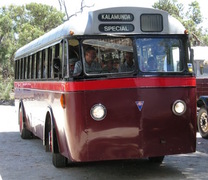 Kalamunda 17
(Click to enlarge)
Kalamunda 17
(Click to enlarge)
Kalamunda 17 is one of the few buses in the collection with a pre-selection gearbox (with an 'actuator' rather than a clutch). It is beautiful bus to drive, if you are familiar with the gear changing system but easy to 'injure' if driven badly. The bus has suffered from several serious problems over the last few years which have caused it to be 'laid-up' waiting for difficult to find parts to complete the maintenance. The current issue involved a leaky 'bubble' seal in the rear nearside axle which was finally fixed recently. Read more about K17 in detail by following the link below.
The 'Horse Bus' has finally received an upgrade.
The Horse Bus, (or Bunbury Bus or Wagonette to apply its various titles) is a two horse, four wheeled version of these once popular carriages manufactured around 1900 and often used in Perth up until the 1920's when replaced by motorised vehicles. Our wagonette came into our possession in 2005 but hasn't had much use or attention since then. The material used in the 'tilt' or canopy, was shredded and aging when it arrived, Some bearers and the flooring needed repairs and replacement. Without the skills to do more it was put into covered storage. Removed from the elements the bus had begun to deteriorate and needed careful restoration by a qualified coach builder. The Council decided it was time to bring the bus up to at least, display standard and a qualified coach builder from Naval base (David Mosely) has undertaken the job of performing the repairs needed. Read more at the link below.
About Our Workshops
- The BPSWA Workshop is situated inside Whiteman Park along with the Bennett Brook Railway, the Perth Electric Tramways and the Park's maintenance workshops.
- Visits by the public to the 'Workshop area are welcome by arrangement - click Contact Us to request a visit. The Workshop hours are 8am to 1pm each Tuesday.
- When visiting the workshops, please consider your safety - wear close-fitting clothing and closed shoes. Children must be supervised and restrained at all times. Hi-Vis vests, safety glasses and ear plugs are available for visitors thanks to one of our generous Sponsors - Stocklands.
- Morning Tea is generally at 9.30am and lunch at 12.00pm. You would be very welcome to join our volunteers in the crib room for coffee or tea and a biscuit.
- If you would like to join our volunteer organisation and participate in preserving Western Australian history - click Join The Fun.
The Workshop
BPSWA has about 2,500 square metres of workshop and undercover storage space at our depot at Whiteman Park. Here we house about 27 buses, some of these we have restored or rebuilt; some are in undercover storage as they are rare or unique and need to be protected from the elements. Others (about 15) have been rebuilt /refurbished and operate as part of our unique collection of operating 'in service' buses and need storage undercover.
The dedicated workshop area has;
The People
Each area has a committed team of trades and trade assistants, and each project has an identified Project Leader working under the management of the workshop foreman. A 'stores' controller, manages the supplies of (largely) recovered parts from previously 'broken up' buses. Usually the 'crib room' has about 25 to 30 people enjoying the fellowship at morning tea or lunch. A small group collect batteries and metal waste from sponsors who continually donate these items to the Society. These are 'on-sold' to earn funds for the restoration activities. There is a group of administrators/archivists who prepare material for display; digitise manuals and other documents for use in the workshops; record and manage the archival material and some 20,000 items of memorabilia, books, photographs and other records.
A small group of volunteers check tyres, batteries, water, oil and fuel each week for the operational buses in the fleet. As well, these intrepid group of volunteers service these buses on a rotational basis to make sure that they are available for the weekly running on the Shuttle and Explorer services operated by the Society for Whiteman Park, each weekend. All our members are volunteers who give up their time and energy to work on a range of projects and activities such as these.
BPSWA has about 2,500 square metres of workshop and undercover storage space at our depot at Whiteman Park. Here we house about 27 buses, some of these we have restored or rebuilt; some are in undercover storage as they are rare or unique and need to be protected from the elements. Others (about 15) have been rebuilt /refurbished and operate as part of our unique collection of operating 'in service' buses and need storage undercover.
The dedicated workshop area has;
- a pit and floor space for general maintenance,
- a body shop,
- a mechanical workshop,
- a dedicated section for up to five major projects/rebuilds.
The People
Each area has a committed team of trades and trade assistants, and each project has an identified Project Leader working under the management of the workshop foreman. A 'stores' controller, manages the supplies of (largely) recovered parts from previously 'broken up' buses. Usually the 'crib room' has about 25 to 30 people enjoying the fellowship at morning tea or lunch. A small group collect batteries and metal waste from sponsors who continually donate these items to the Society. These are 'on-sold' to earn funds for the restoration activities. There is a group of administrators/archivists who prepare material for display; digitise manuals and other documents for use in the workshops; record and manage the archival material and some 20,000 items of memorabilia, books, photographs and other records.
A small group of volunteers check tyres, batteries, water, oil and fuel each week for the operational buses in the fleet. As well, these intrepid group of volunteers service these buses on a rotational basis to make sure that they are available for the weekly running on the Shuttle and Explorer services operated by the Society for Whiteman Park, each weekend. All our members are volunteers who give up their time and energy to work on a range of projects and activities such as these.

